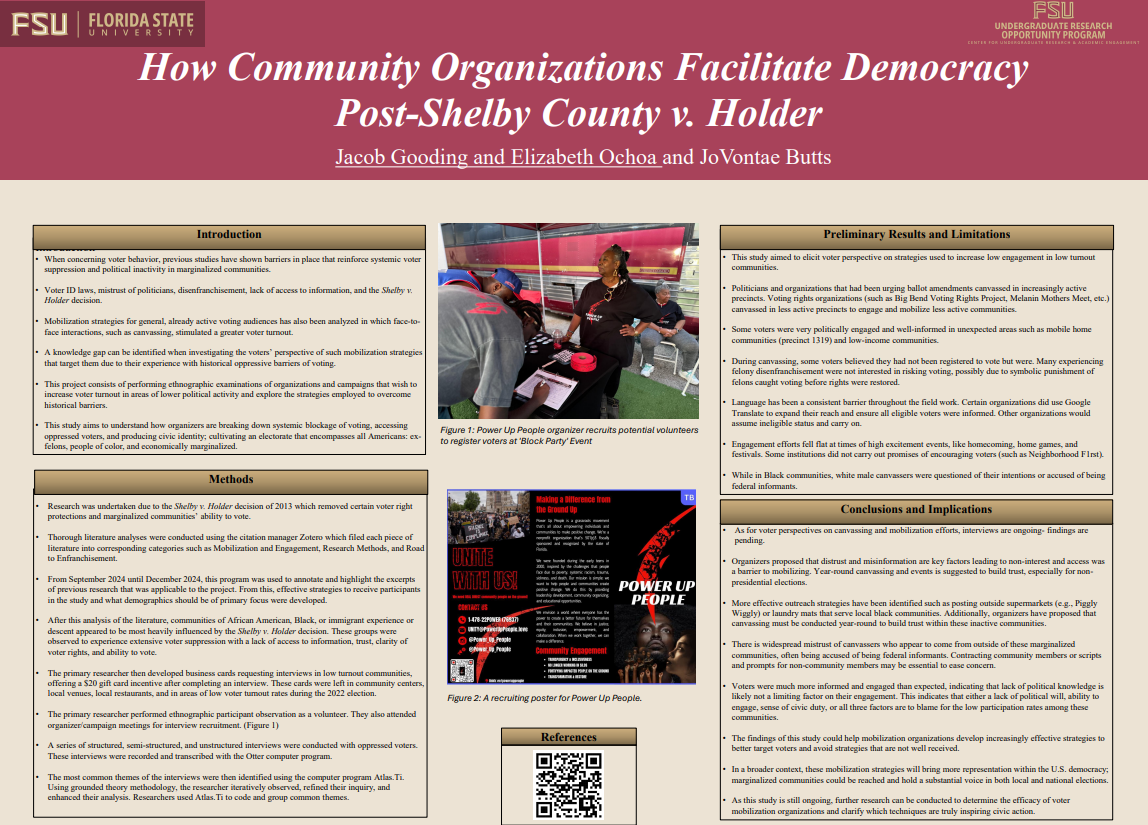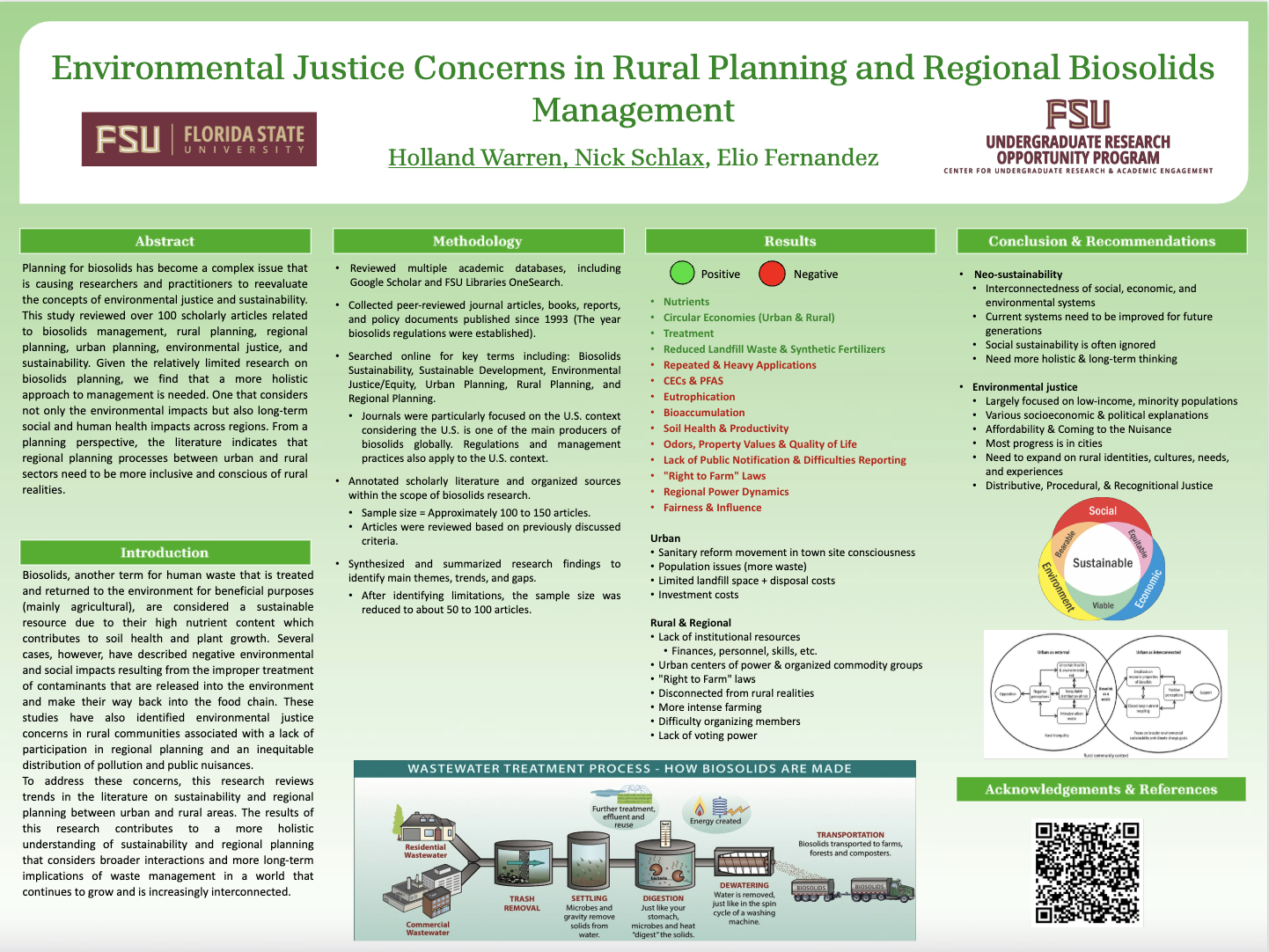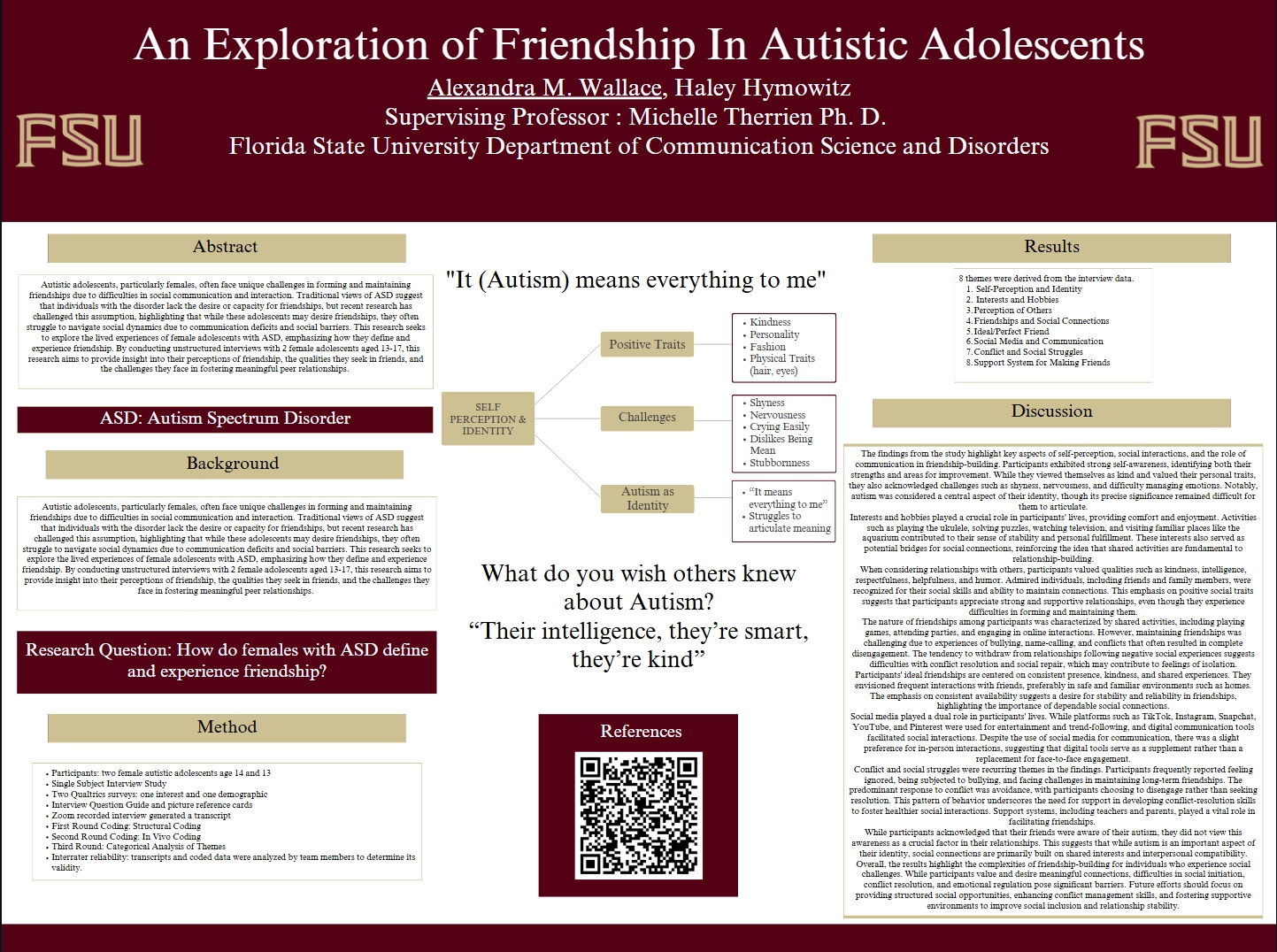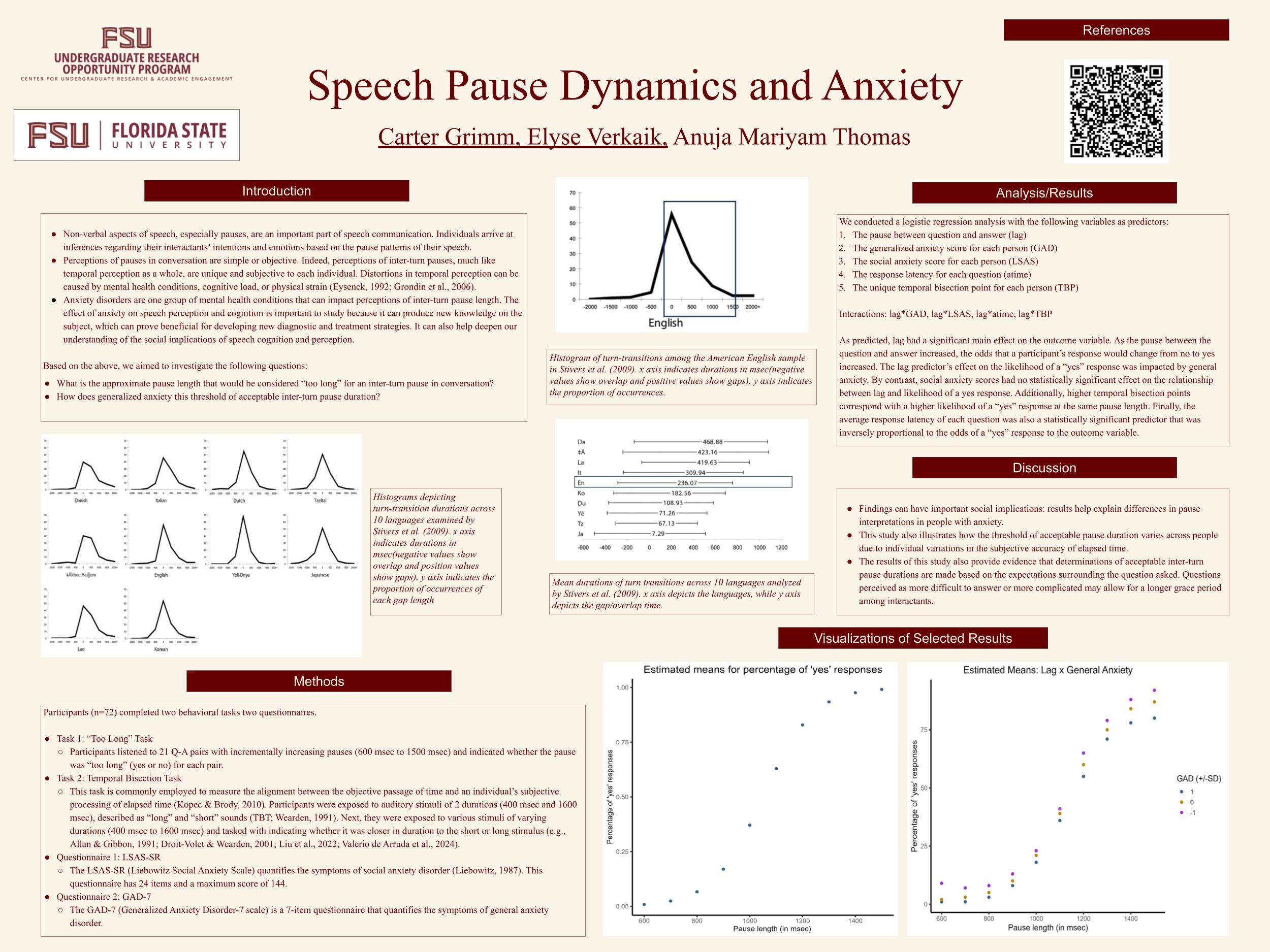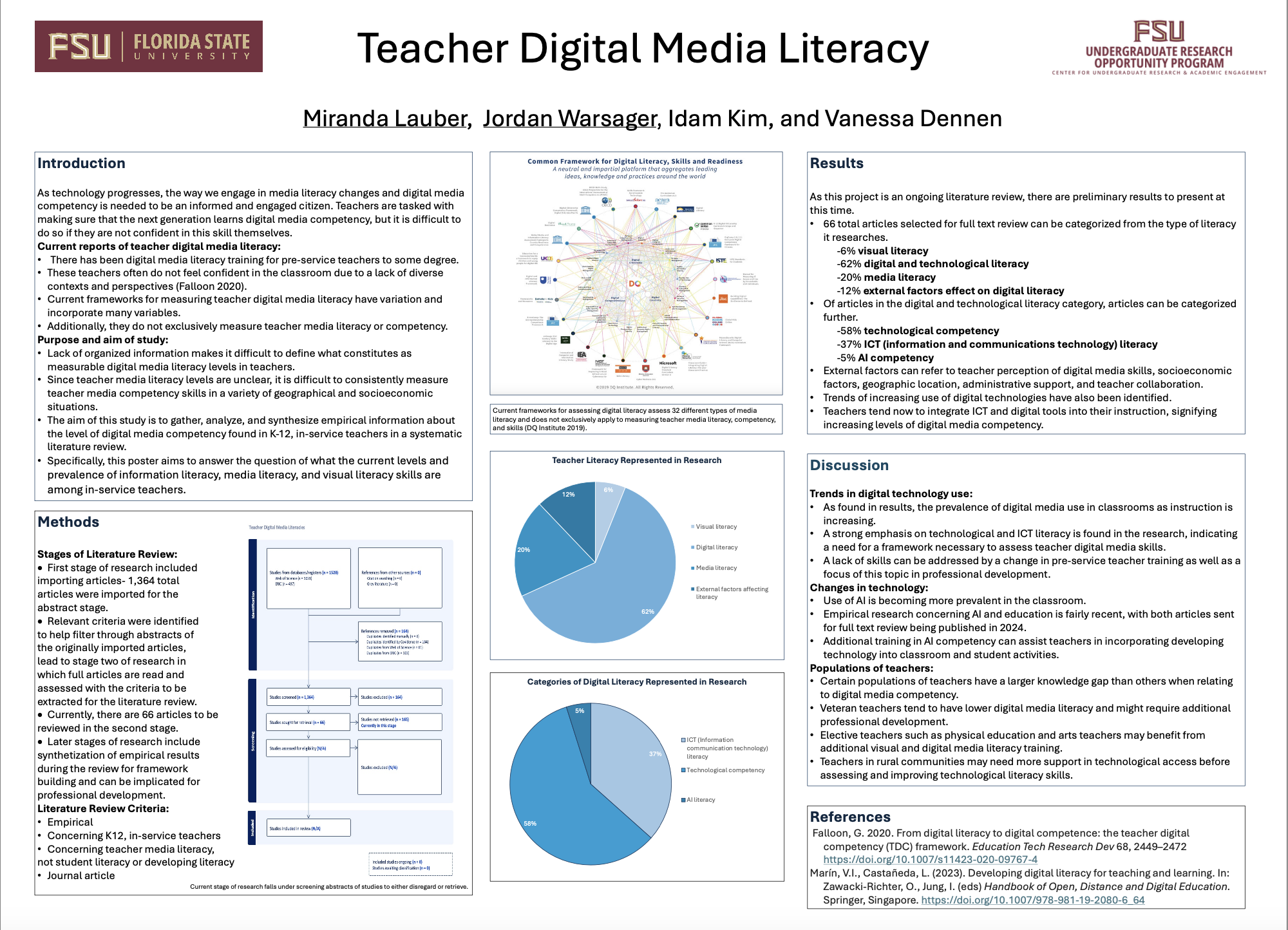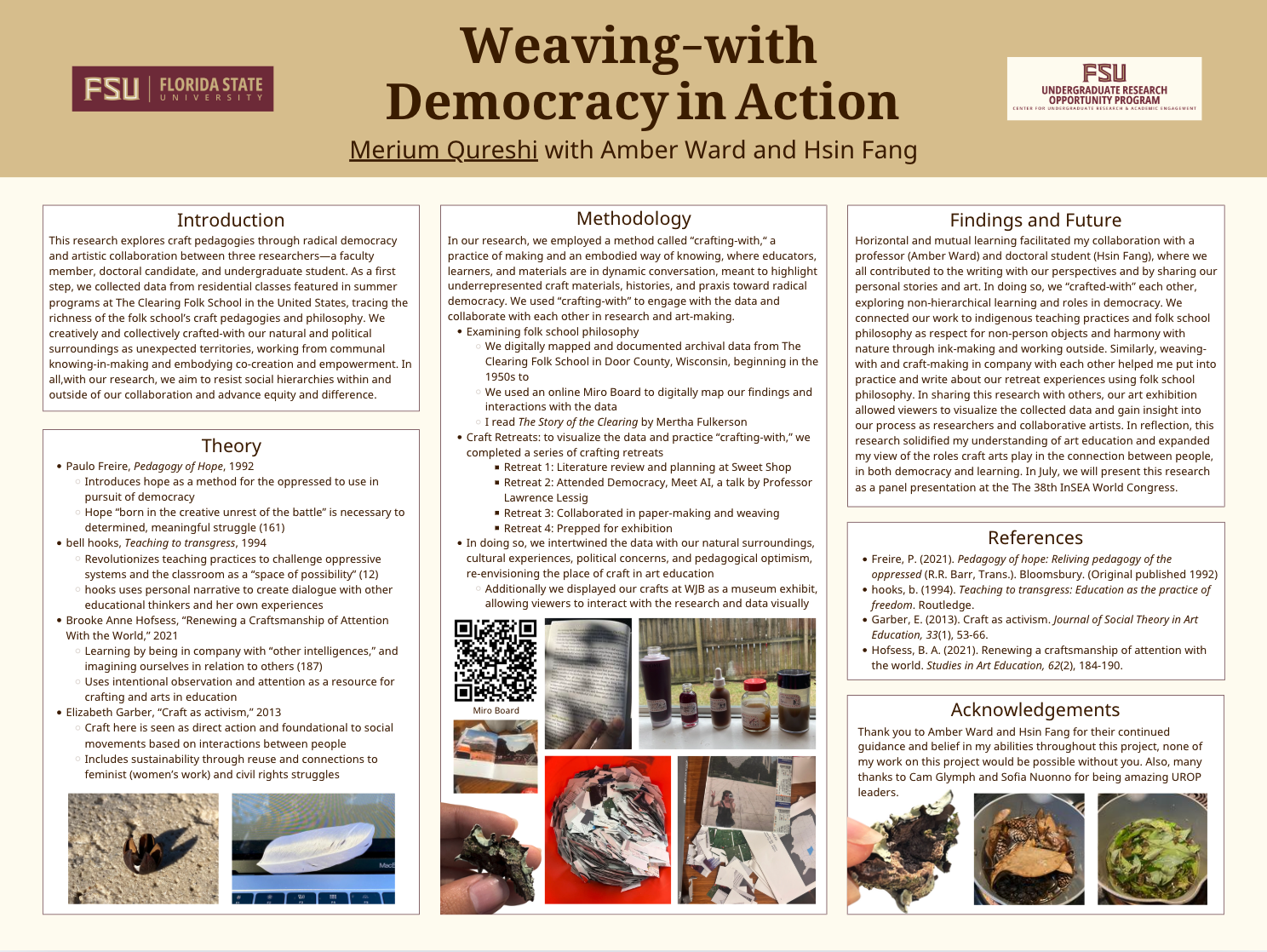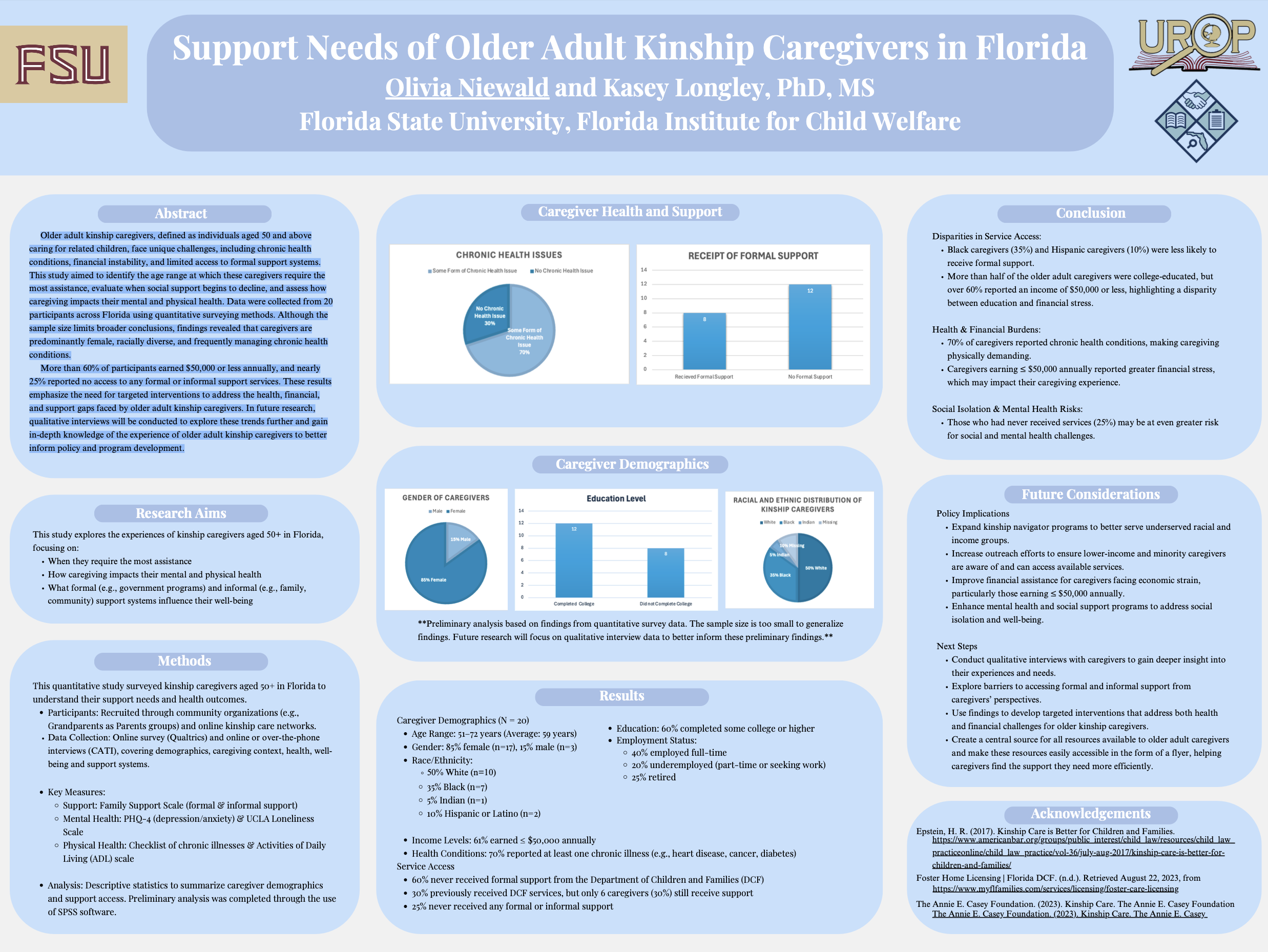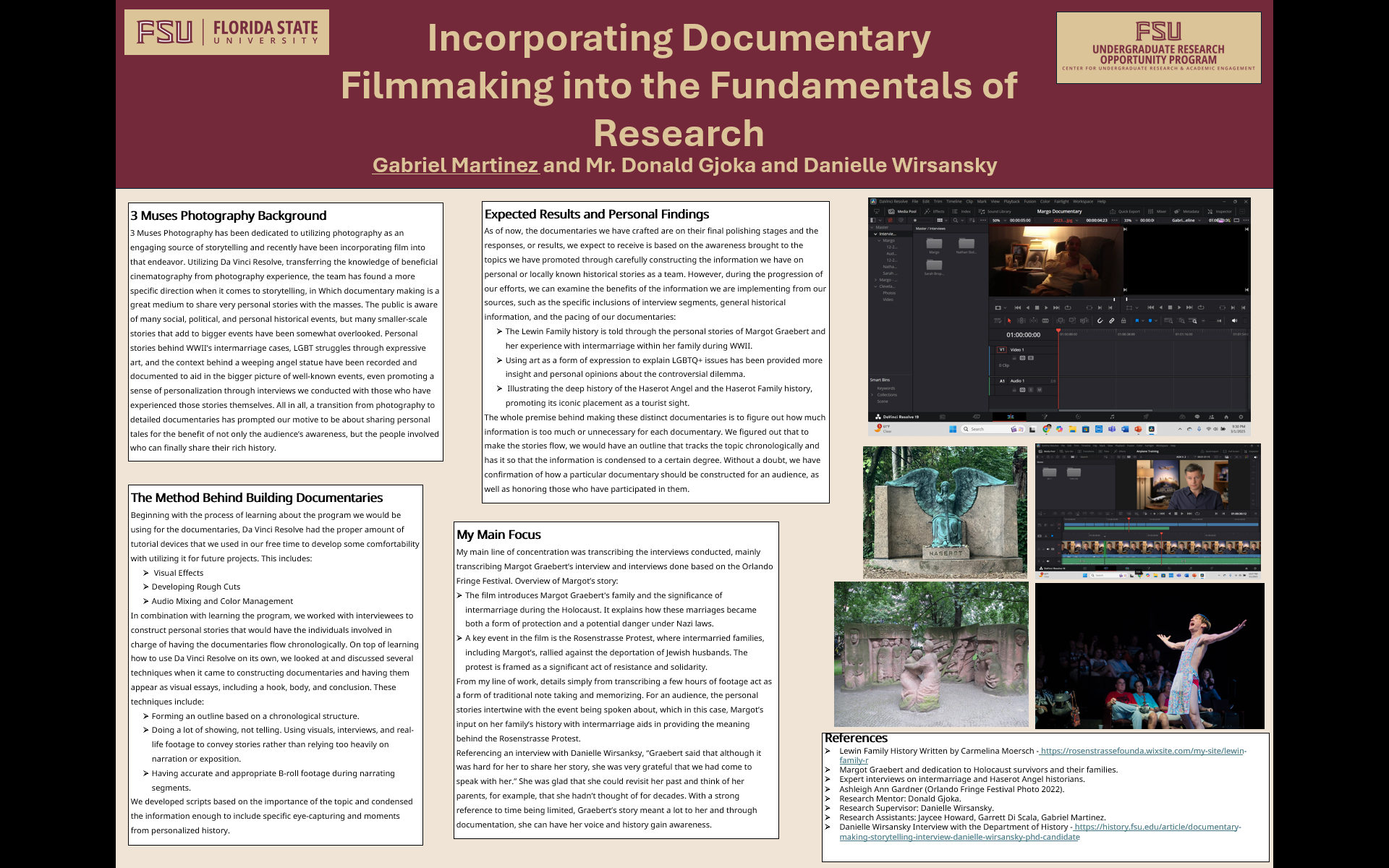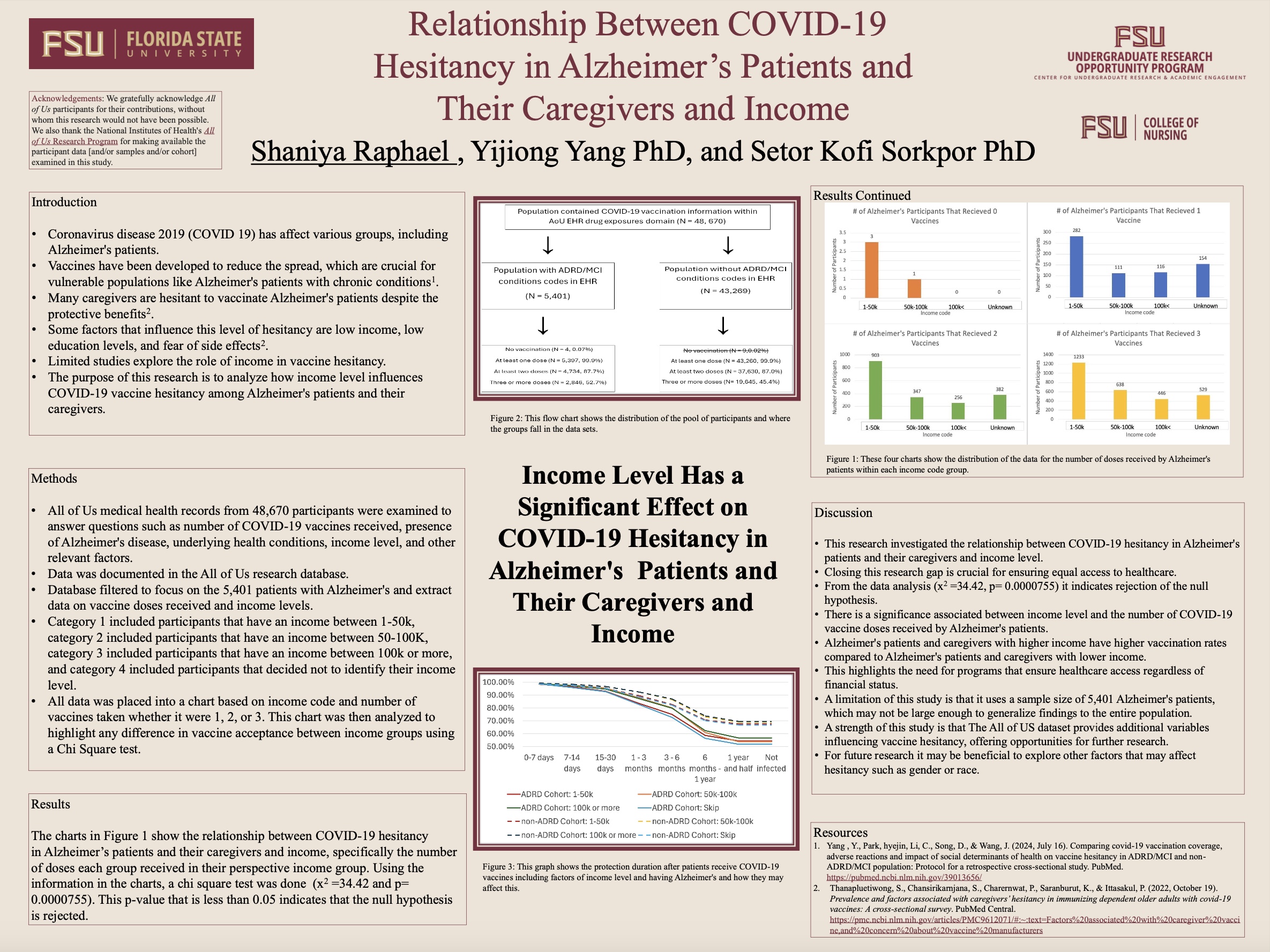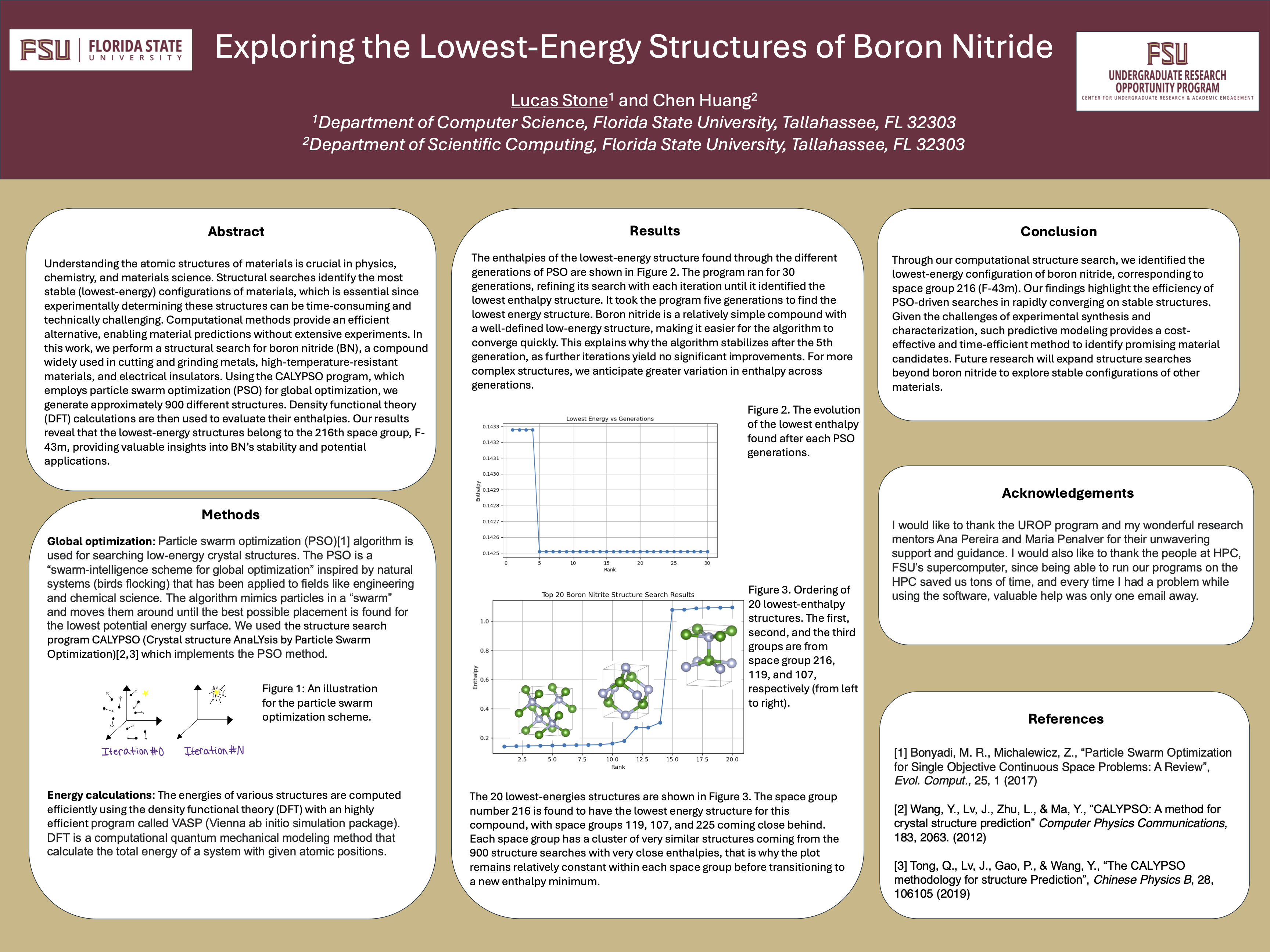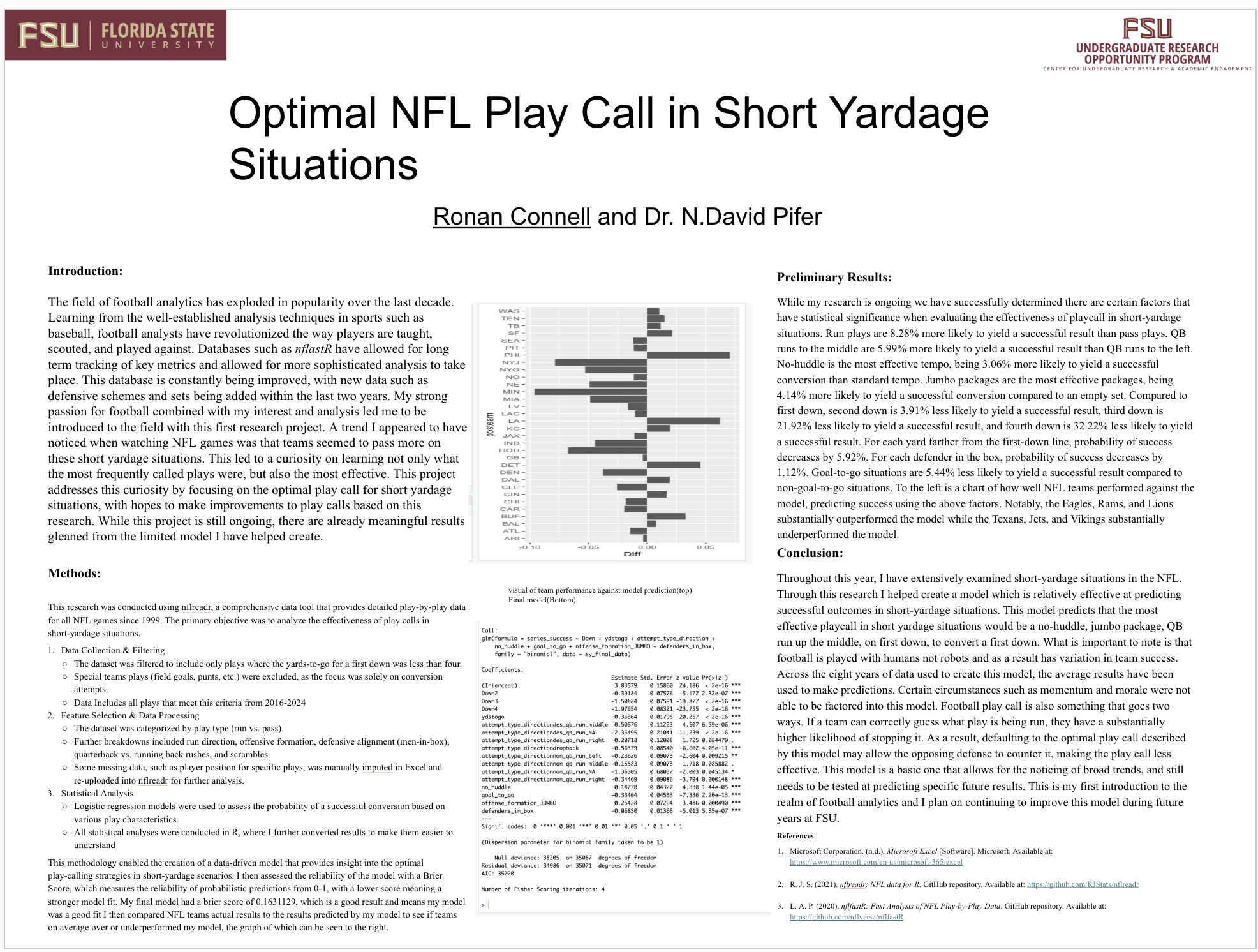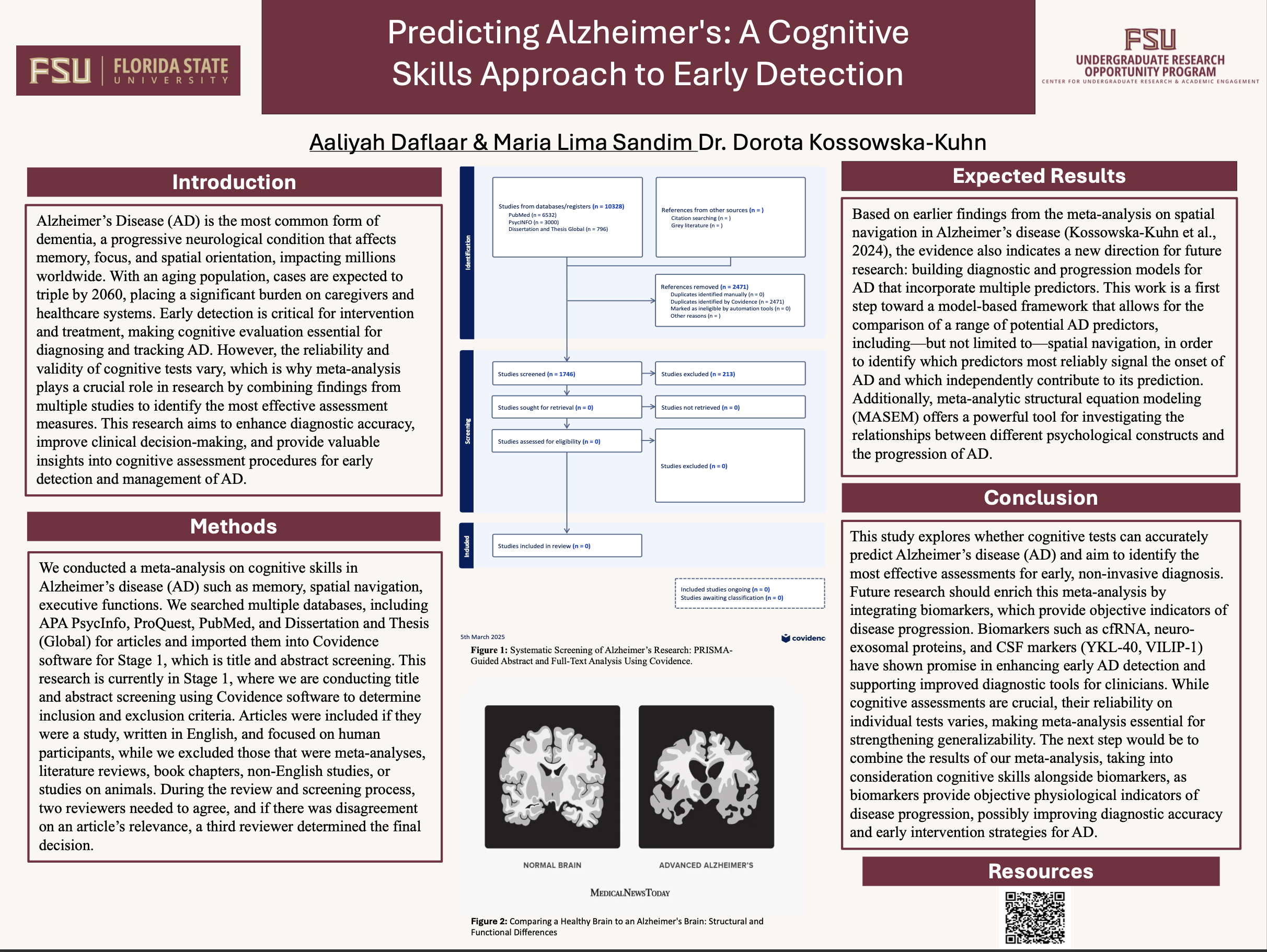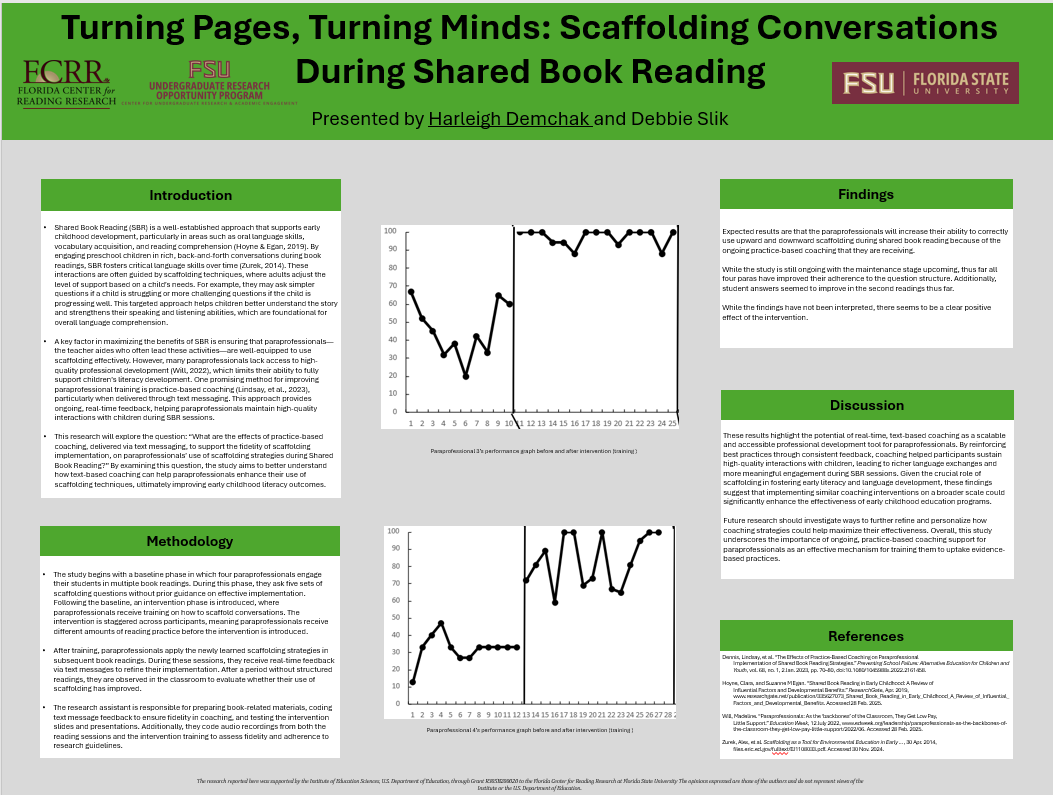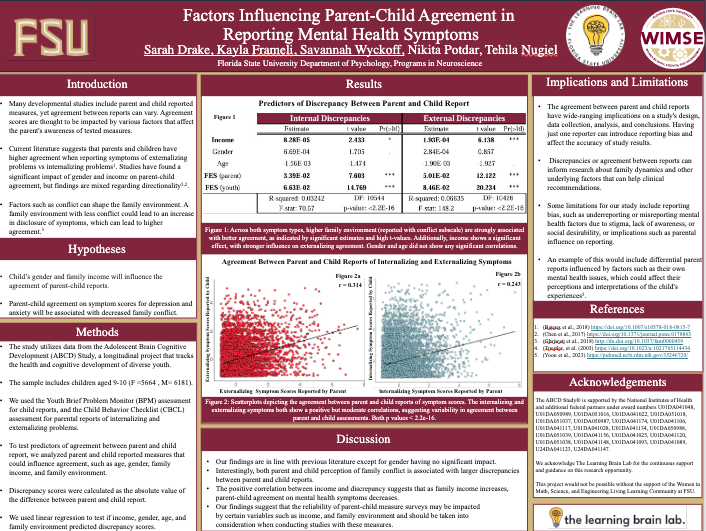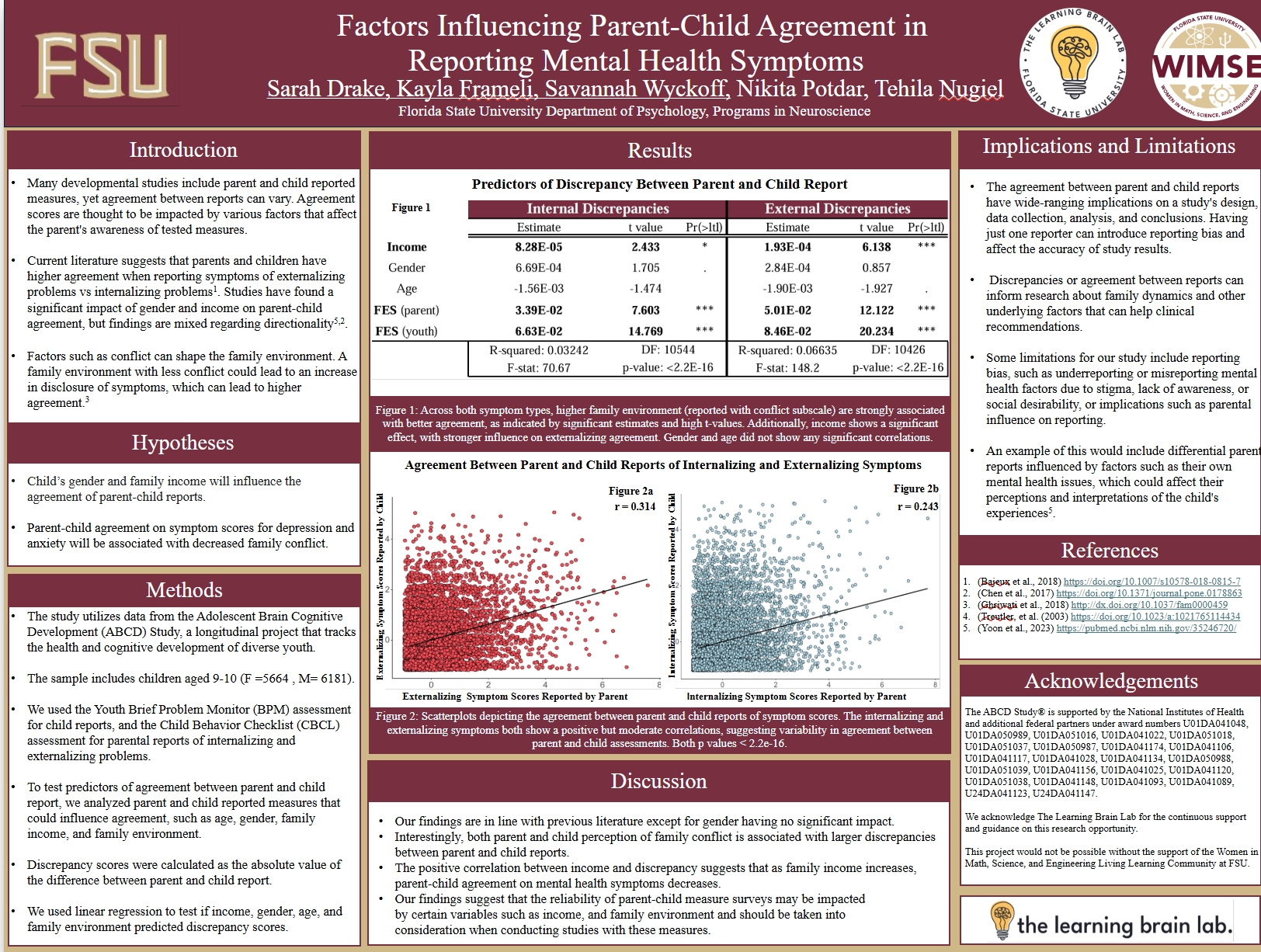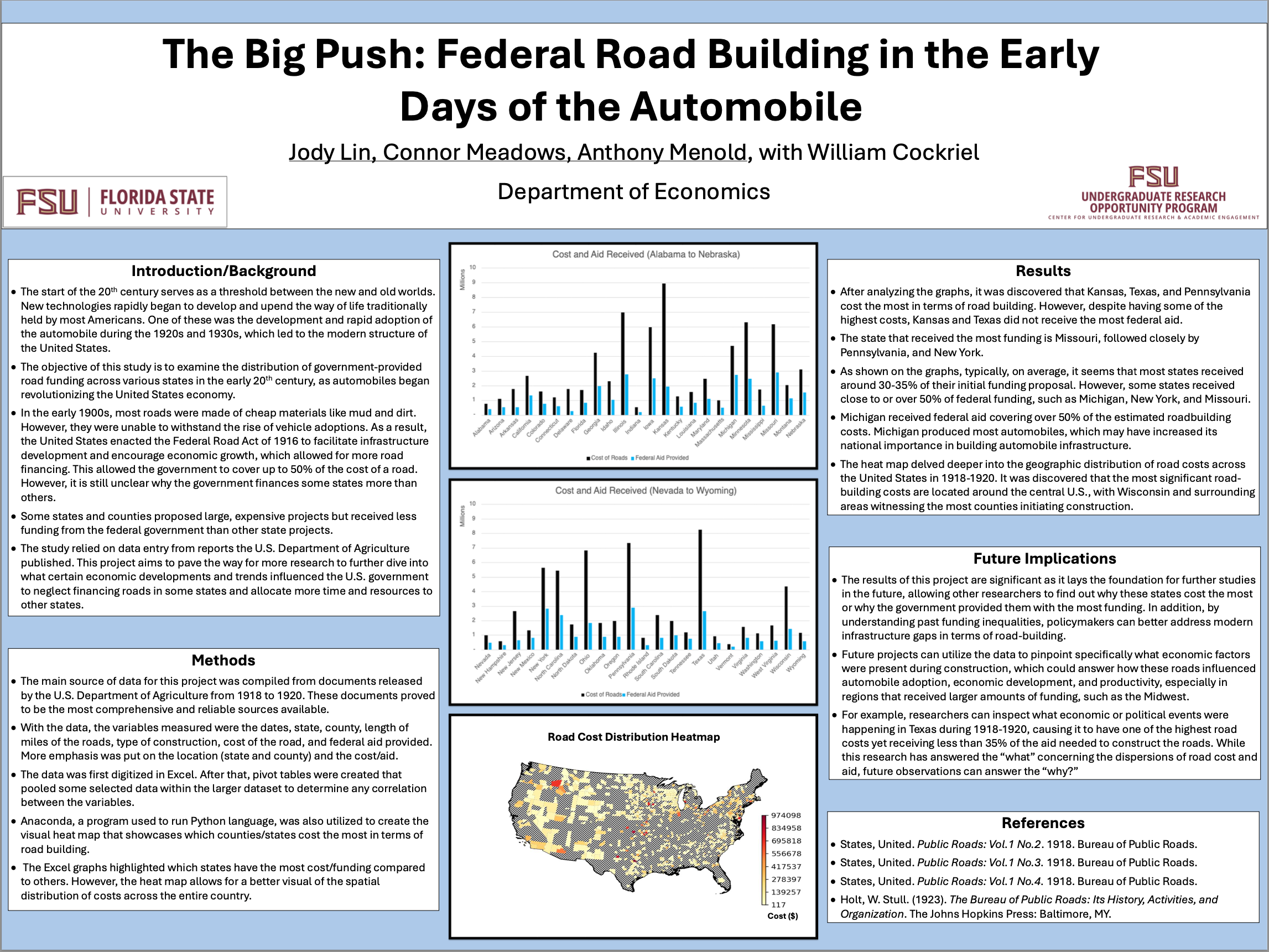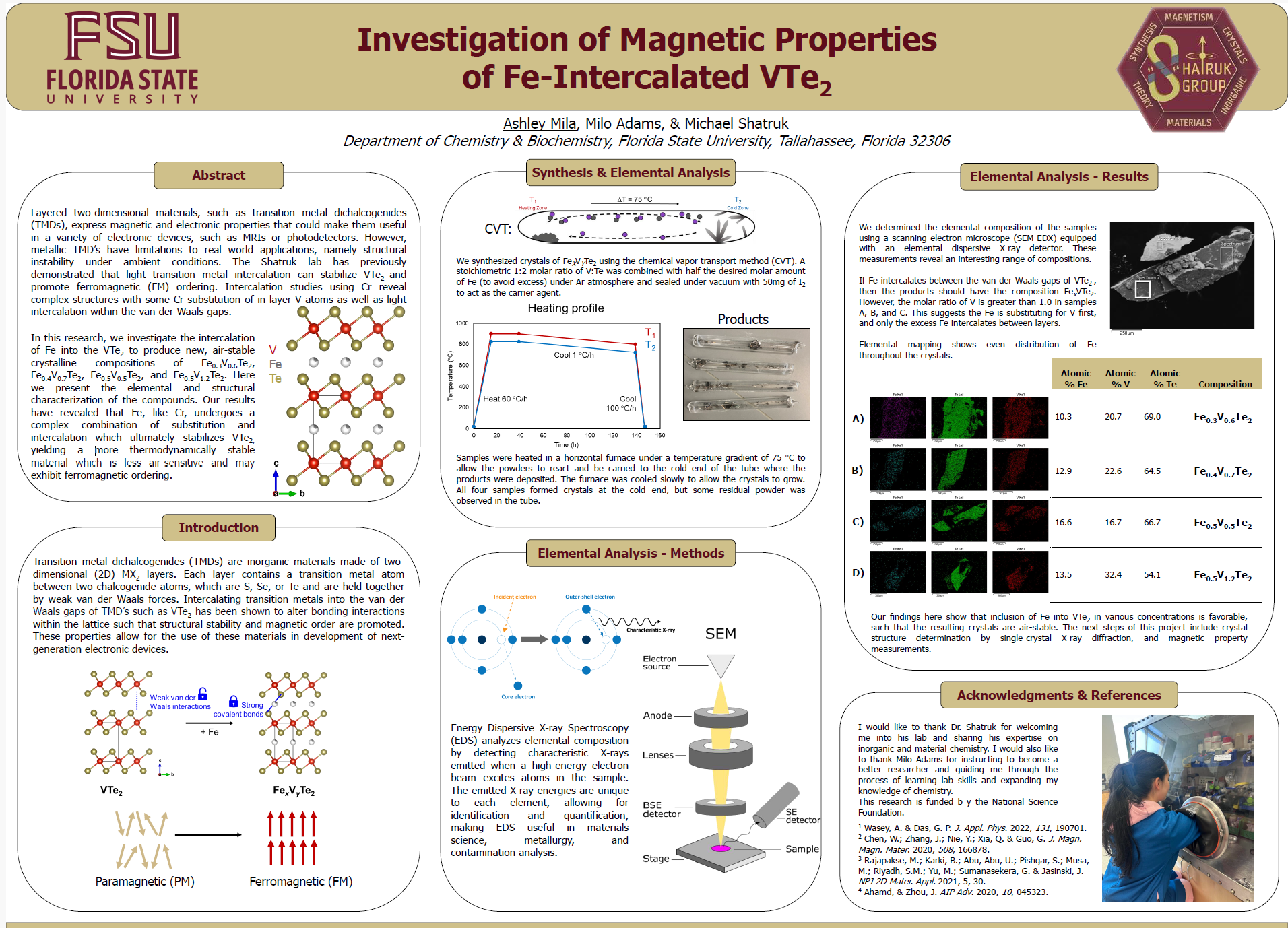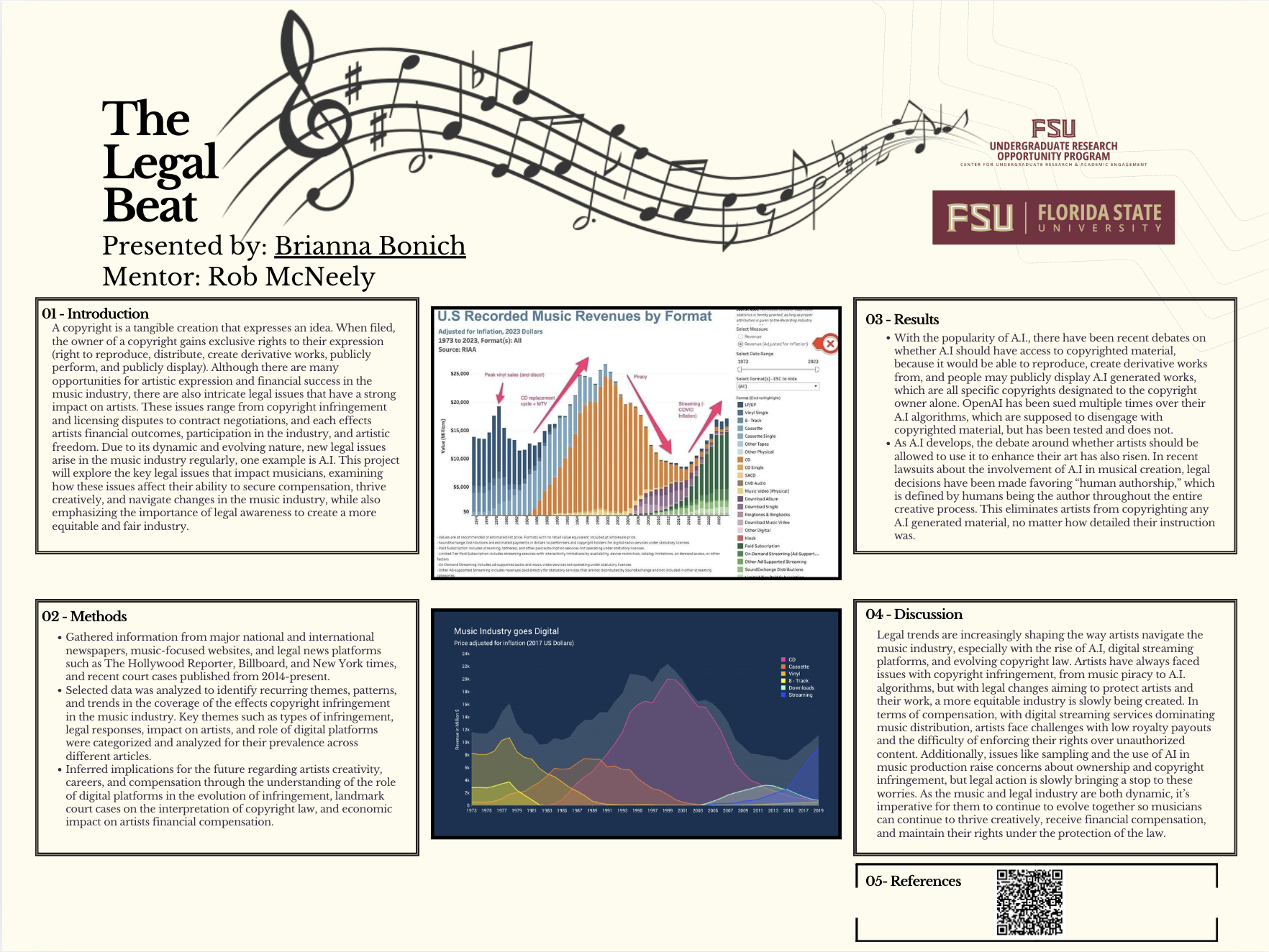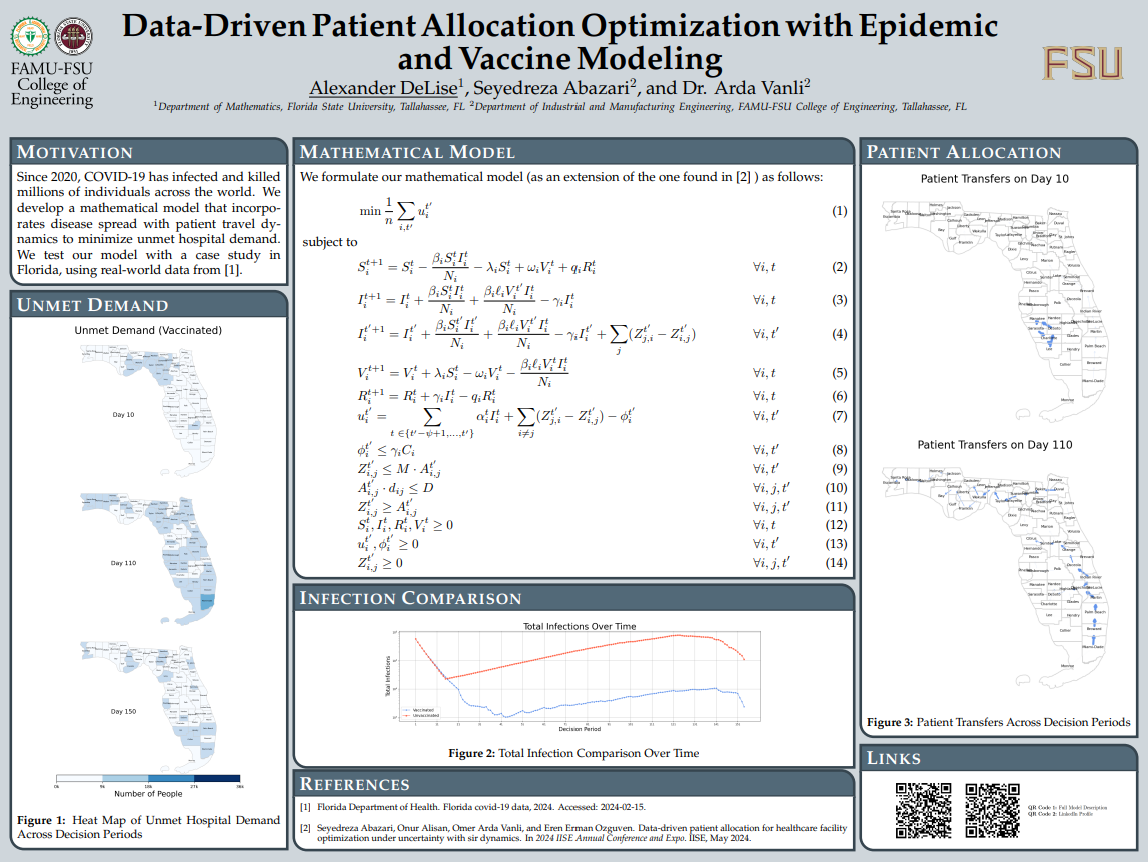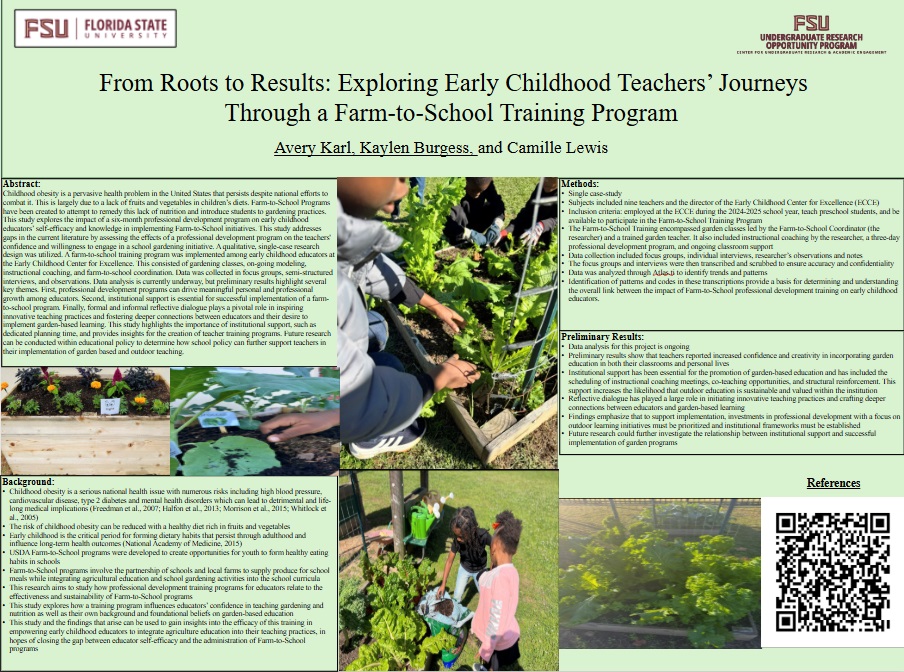Research Symposium
25th annual Undergraduate Research Symposium, April 1, 2025
Elizabeth Ochoa Poster Session 2: 10:45 am - 11:45 am/ Poster #71
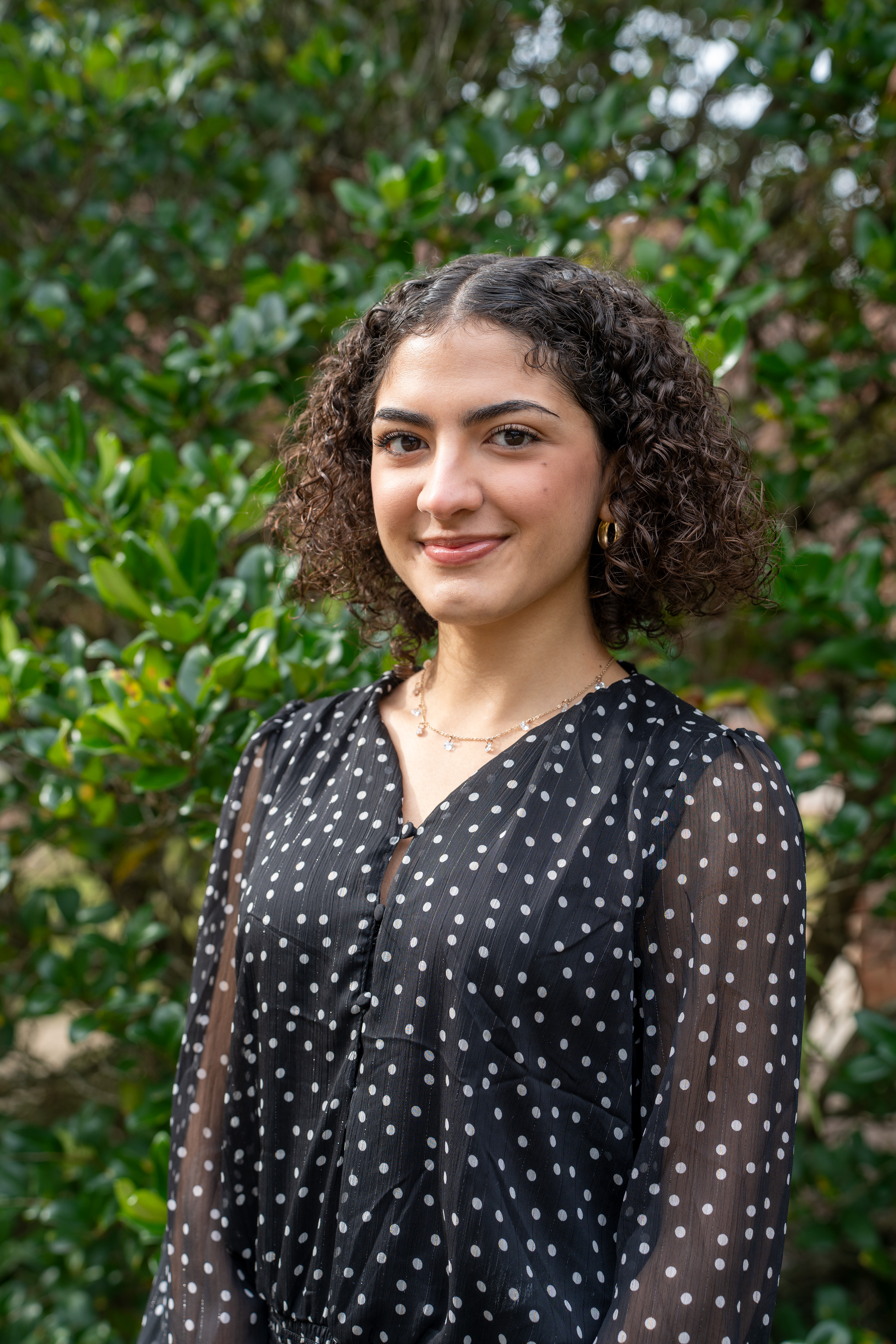
BIO
I am a class of 2027 first-generation honors student from Fort Lauderdale, Florida, pursuing a dual degree in Political Science and Media Communication Studies. Post-graduation, I plan on applying for law school in hopes of being involved with either environmental or entertainment law. Politics and International Relations has been a relatively recent passion of mine, I always strive to expand my awareness of current events. This also took flight during this recent presidential election, it being the first one I was able to vote in. I wish to extend the importance of formulating a civic identity and duty to my generation, I feel that Generation Z would greatfully benefit by involving ourselves in democratic practices and knowledge. I also have a great interest in the media world, I thoroughly enjoy creating whether it be comedic scripts, social media graphics, or event ideas. This allowed me to achieve my placement as the communications chair of the FSU 2025 Homecoming Executive Council. In the future I dream to fulfill a career involving both the media and politics, unleashing a lasting impact on the world around me in the digital age we are living in.
How Community Organizations Facilitate Democracy Post-Shelby County v. Holder
Authors: Elizabeth Ochoa, JoVontae ButtsStudent Major: Political Science and Media Communication Studies
Mentor: JoVontae Butts
Mentor's Department: Sociology Mentor's College: College of Social Sciences and Public Policy Co-Presenters: Jacob Gooding
Abstract
Previous mobilization studies and strategies have shared bias towards currently active and reachable voters, creating a knowledge gap in how disengaged voters can be included in scholarly discourse. This study aims to investigate the strategies grassroots voter organizations employ to address voter suppression and grappling disengaged voters despite institutional barriers. As well as if and how the hurdles of political distrust, inaccessibility to information, and clarity of voter rights can be overcome. By analyzing these efforts, we can estimate how these strategies are impacting the attitudes of the voters they seek to engage. This may also inspire future insight into how democratic processes can become more inclusive and expansive over populations that have been historically oppressed after the Shelby County v. Holder decision. Significant literature review was conducted concerning past voter suppression and voter behavior among diverse populations, genders, and age groups. Ethnographic examination of voter organizations and campaigns in the Tallahassee Florida area during the 2024 Presidential election, alongside their efforts to mobilize oppressed voters, was employed using participant observation and semi-structured interviews. This data was thematically coded to organize and identify consistent trends. It has been gathered thus far that many disengaged voters have a consistent distrust for politicians and the political process, possess a lack of information, or were unaware about their eligibility to vote. Insights have given light to more local, marginalized community-centered areas that may be increasingly effective for engaging oppressed voters such as local supermarkets or laundry mats.
Keywords: voting rights mobilization
25th annual Undergraduate Research Symposium, April 1, 2025
Holland Warren Poster Session 3: 1:45 pm - 2:45 pm/ Poster #112
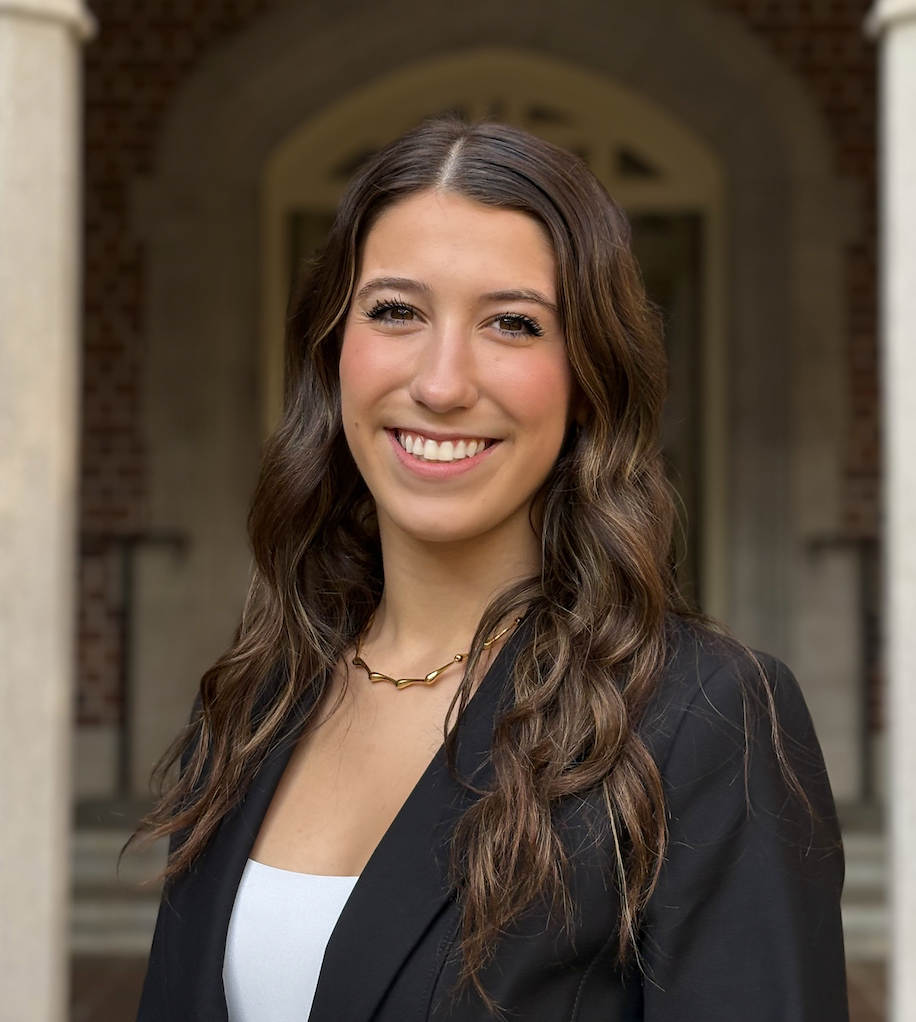
BIO
Hi! I'm from Birmingham, Alabama, and I'm passionate about political ecology, especially issues of environmental racism. I'm getting a dual degree Political Science and Environment & Society, and I’m committed to understanding and addressing the systemic inequalities in environmental policy. I’m pre-law, with the goal of litigating for the EPA to hold polluters accountable and, eventually, serving in an elected office to push for meaningful environmental justice reforms.
Environmental Justice Concerns in Rural Planning and Regional Biosolids Management
Authors: Holland Warren, Elio FernandezStudent Major: Political Science, Environment and Society
Mentor: Elio Fernandez
Mentor's Department: Urban & Regional Planning, Interdisciplinary Social Sciences Mentor's College: College of Social Sciences and Public Policy Co-Presenters: Nick Schlax
Abstract
Planning for biosolids has become a complex issue that is causing researchers and practitioners to reevaluate the concepts of environmental justice and sustainability. This study reviewed over 100 scholarly articles related to biosolids management, rural planning, regional planning, urban planning, environmental justice, and sustainability. Given the relatively limited research on biosolids planning, we find that a more holistic approach to management is needed. One that considers not only the environmental impacts but also long-term social and human health impacts across regions. From a planning perspective, the literature indicates that regional planning processes between urban and rural sectors need to be more inclusive and conscious of rural realities.
Keywords: biosolids, sustainability, environment, development
25th annual Undergraduate Research Symposium, April 1, 2025
Alexandra Wallace Poster Session 3: 1:45 pm - 2:45 pm/ Poster #28
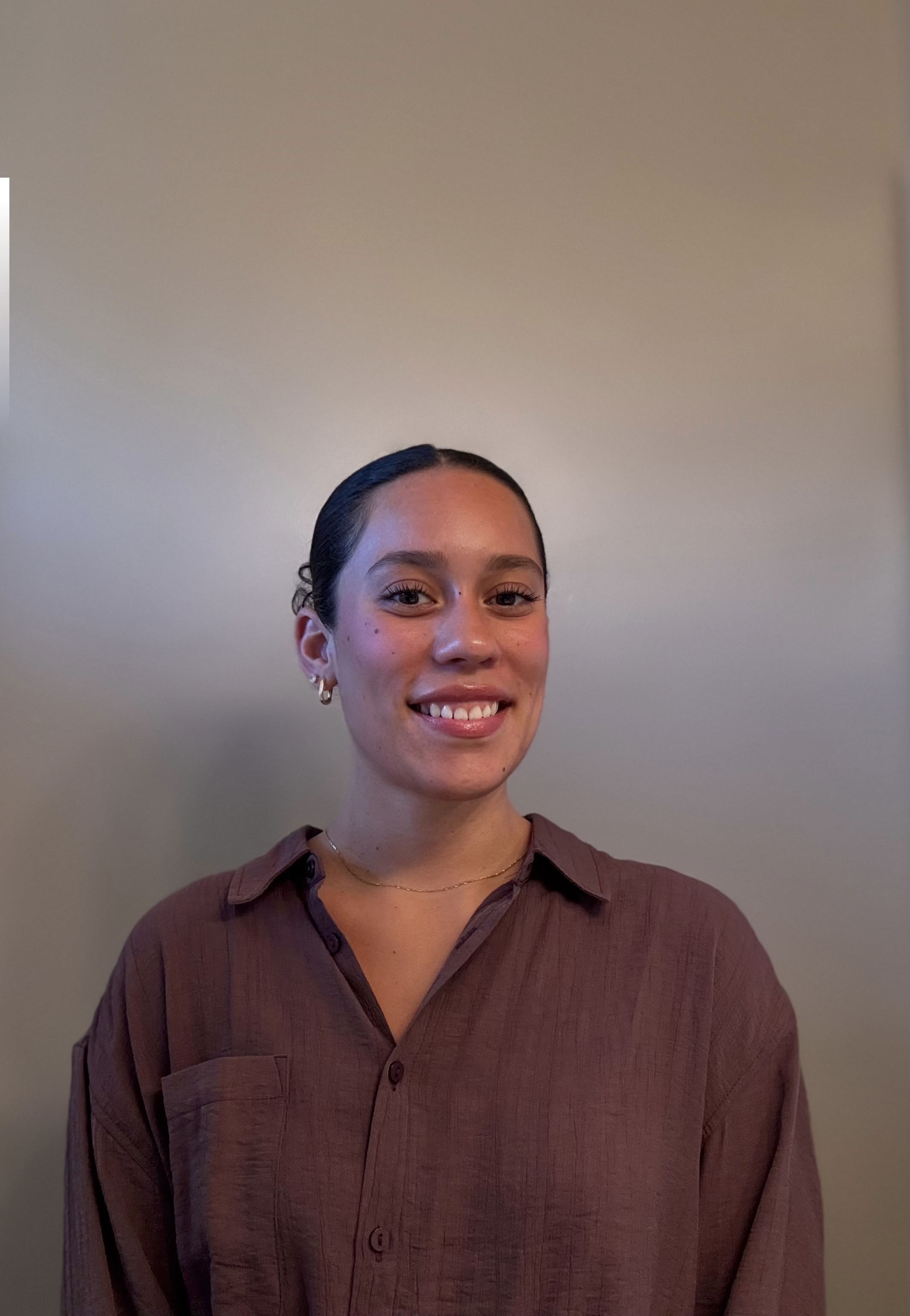
BIO
Alexandra Wallace is an aspiring speech-language pathologist with a passion for autism and social development. She is presenting her Honors in the Major Project, An Exploration of Friendship in Autistic Adolescents, under the mentorship of Dr. Therrien. Her research focuses on understanding the unique social experiences of autistic adolescents and ways to support meaningful peer relationships.
As she approaches graduation, Alexandra is eager to expand her knowledge in communication sciences, particularly in autism and social communication. She is dedicated to helping individuals with communication challenges build connections and thrive socially. She will attend Florida State University to pursue a master’s degree in speech-language pathology. At FSU, she looks forward to advanced clinical training and research opportunities that will enhance her ability to support individuals with autism and other communication disorders.
Beyond academics, Alexandra is passionate about advocacy and education, striving to increase awareness and understanding of autism. She hopes to make a lasting impact by implementing evidence-based strategies that foster social success. With a commitment to empowering individuals through communication, she is excited to contribute to the field of speech-language pathology and make a difference in the lives of those she serves.
An Exploration of Friendship in Autistic Adolescents
Authors: Alexandra Wallace, Dr. Michelle TherrienStudent Major: Communication Science and Disorders
Mentor: Dr. Michelle Therrien
Mentor's Department: Communication Science and Disorders Mentor's College: School of Communication Science and Disorders Co-Presenters:
Abstract
Autistic adolescents, particularly females, often face unique challenges in forming and maintaining friendships due to difficulties in social communication and interaction. Traditional views of ASD suggest that individuals with the disorder lack the desire or capacity for friendships, but recent research has challenged this assumption, highlighting that while these adolescents may desire friendships, they often struggle to navigate social dynamics due to communication deficits and social barriers. This research seeks to explore the lived experiences of female adolescents with ASD, emphasizing how they define and experience friendship. By conducting unstructured interviews with 2 female adolescents aged 13-17, this research aims to provide insight into their perceptions of friendship, the qualities they seek in friends, and the challenges they face in fostering meaningful peer relationships.
Keywords: autism, friendship, females
25th annual Undergraduate Research Symposium, April 1, 2025
Elyse Verkaik Poster Session 1: 9:30 am - 10:30 am / Poster #72

BIO
My name is Elyse Verkaik. I am from Eustis, Florida, and I am a second year Behavioral Neuroscience major on a premed track at Florida State University. My goal is to pursue a career in medicine, with a particular interest in neuroscience and mental health. I’m passionate about contributing to advancements in clinical research or psychiatry in the future. Outside my work in research, I am a member of the Medical Response Unit on campus, where we volunteer as first responders on campus.
Speech Pause Dynamics and Anxiety
Authors: Elyse Verkaik, Anuja Mariyam ThomasStudent Major: Behavioral Neuroscience
Mentor: Anuja Mariyam Thomas
Mentor's Department: Psychology Mentor's College: Arts and Sciences Co-Presenters: Carter Grimm
Abstract
The distribution and lengths of pauses in speech can be a source of insight into the rapport and relationship between the speakers. Pause dynamics can also provide clues to an individual’s state of mind. Because pauses in conversation are so meaningfully rich, speakers use these pauses as social cues in their everyday interactions. For example, violating implicit rules of pause dynamics by waiting too long to respond can harm conversational outcomes. But how long is too long? We present work that addresses this question. Participants were presented with audio recordings of question-answer turn exchanges, each featuring varying pause durations. Participants were asked to indicate whether they believed that the respondent waited too long to answer the question. Participants also completed anxiety questionnaires and a temporal bisection task. This study determined that pauses of approximately 1000 milliseconds are considered “too long”. This finding is consistent with previous research. The results of this study also provide preliminary evidence that intrapersonal characteristics such as anxiety levels as well as item characteristics such as question complexity and ease of retrieval can alter this threshold. These results are consistent with the literature review we conducted regarding the general mechanisms of speech cognition and speech pause perception. Overall, the results of the literature review led to the expectation that dopaminergic disruptions should lead to disruptions in temporal processing.
Keywords: Psychology, cognition, anxiety, speech, and pauses.
25th annual Undergraduate Research Symposium, April 1, 2025
Miranda Lauber Poster Session 1: 9:30 am - 10:30 am/ Poster #211

BIO
My name is Miranda Lauber and I am from Sarasota, FL. I am a behavioral neuroscience student here at Florida State and I am on a pre-health track, planning to go to medical school after completing my undergraduate degree. The research project I am currently working on is a systematic literature review under the field of education and focuses on measuring and understanding the current state of teacher media literacies and competencies. This research has later implications in teacher training and professional development. Understanding of this topic is important for teacher and related student success.
Teacher Digital Media Literacy
Authors: Miranda Lauber, Vanessa DennenStudent Major: Behavioral Neuroscience
Mentor: Vanessa Dennen
Mentor's Department: Department of Educational Psychology & Learning Systems Mentor's College: Anne Spencer Daves College of Education, Health, and Human Sciences Co-Presenters: Jordan Warsager
Abstract
Our research concerns how teachers show and practice media literacy and competency. As a literature review, our purpose is to consolidate and understand a wide range of empirical research relating to this topic. This topic is important as insight into how in-service teachers practice media competency provides reason on how to better support training and practice for technology that is constantly changing. This research can also be applied to student outcomes and implicated for teacher training and professional development. Our research design is a systematic review of papers concerning teacher media competency and literacy. We defined criteria (e.g., empirical studies, research concerning in-service K12 teachers, not pertaining to student media literacy, etc.) for the articles we sent through the review. We have read abstracts of studies to assess if they were relevant or not and then will examine the narrowed pool of studies to see if they should be extracted for later stages of research. While we do not have concrete results yet, preliminary findings show that data reflects trends in how factors such as funding for schools, geographic location, and socioeconomic environments affect teacher digital media literacy. Additionally, we have found that the selected research articles are largely focused on digital media literacy with an emphasis on technological competency and ICT use. Trailing behind that is research concerning general media and visual arts literacy. Results and understanding from this research can be applied to policy changes that direct funding and awareness towards media
literacy and ICT training for teachers.
Keywords: teacher, digital, media, literacy, competency
25th annual Undergraduate Research Symposium, April 1, 2025
Merium Qureshi Poster Session 3: 1:45 pm - 2:45 pm/ Poster #207
BIO
Merium Qureshi is a first year student at FSU majoring in Art History and Human Rights & Social Justice. Her research interests lie in art history and analysis, specifically looking at folk/indigenous art and textiles, the cottage industry, and the passage of traditional artistic practices. She is a Presidential Scholar, member of the College of Fine Arts Leadership Council, and treasurer for the Undergraduate Art History Association. In the future, Merium is considering pursuing a career either in the museum field with curation and collections work or in advocacy and law.
Weaving-with Democracy in Action
Authors: Merium Qureshi, Amber WardStudent Major: Art History and Human Rights & Social Justice
Mentor: Amber Ward
Mentor's Department: Art Education Mentor's College: Fine Arts Co-Presenters:
Abstract
This presentation introduces exploring craft pedagogies through radical democracy with collaboration and residential classes featured in summer programs from a folk school in the United States. In addition to tracing the richness of the folk school’s pedagogical emphasis on craft, we creatively and collectively craft-with our natural and political surroundings as unexpected territories. Working from a communal way of knowing-in-making and embodying co-creation and empowerment, we aim to resist social hierarchies within and outside of our collaboration and advance equity and difference.
A research methodology we are calling ‘crafting-with’ is used to foreground underrepresented craft materials, histories, and praxis toward a radical democracy. This methodology views crafting-with as both practice of making and as an embodied way of knowing, where educators, learners, and materials are in dynamic conversation. Inspired by folk school philosophy, we use a series of craft retreats to document archival data on folk school craft, beginning in the 1950s, and intertwine it with our natural surroundings, cultural experiences, political concerns, and pedagogical optimism as a way to re-envision the place of craft in art education.
An additional unexpected territory materializing from this research is one of horizontal mentorship whereby we work to mentor each other all while acknowledging the various power differentials that accompany our given identities, while navigating the discomfort of a new collaboration with fluid, unpredictable responsibilities and goals.
In sum, this research interweaves data, pedagogy, culture, gender, and political engagement to animate art education toward a more collaborative and democratic future through craft.
Keywords: folk school pedagogy, democracy, art education
25th annual Undergraduate Research Symposium, April 1, 2025
Olivia Niewald Poster Session 1: 9:30 am - 10:30 am / Poster #277
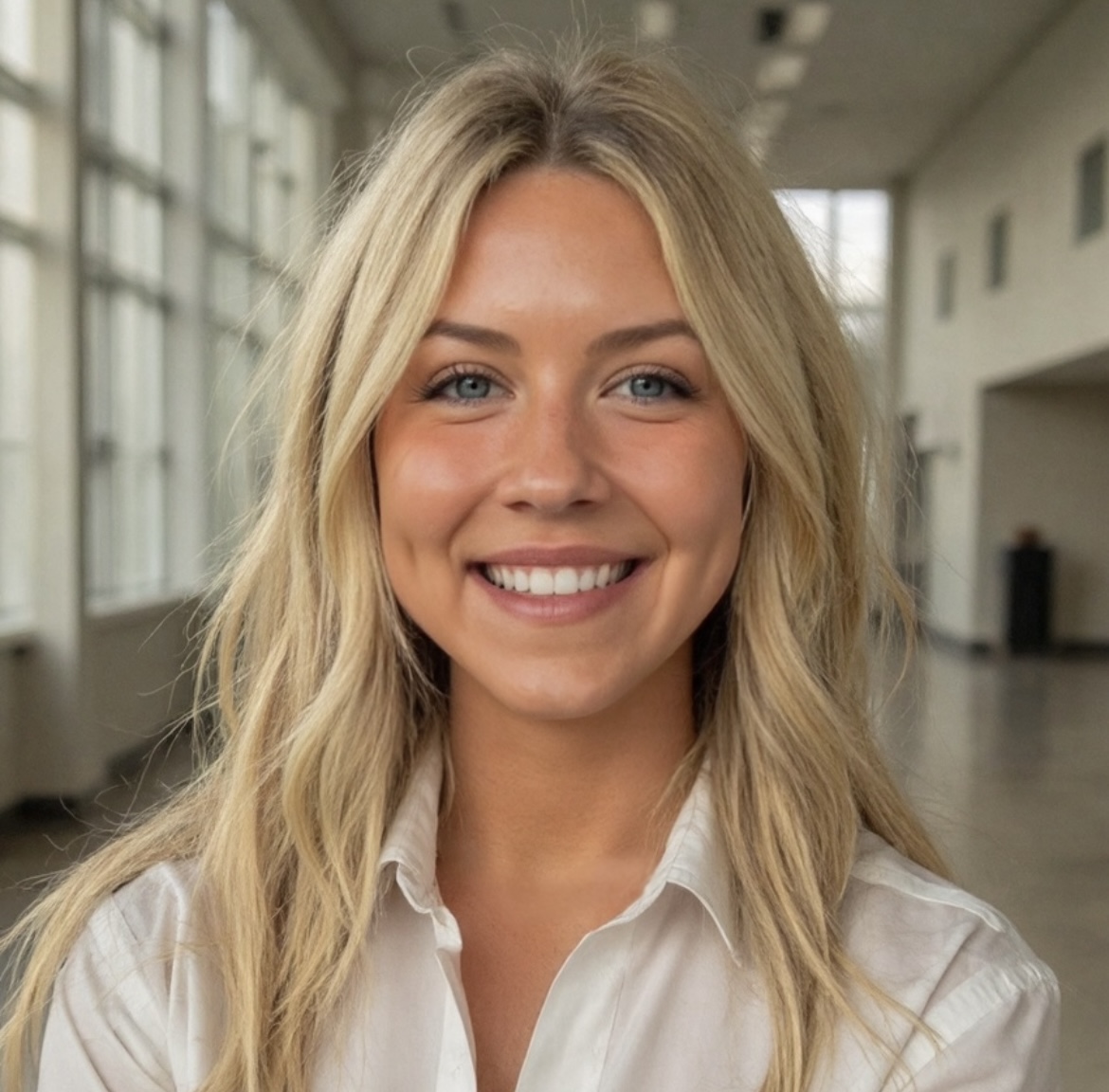
BIO
Olivia Niewald is from Port Orange, Florida, and is a member of the track and cross country team at Florida State University. She is pursuing a career in medicine and is passionate about both academics and athletics. Outside of her studies and training, she enjoys volunteer coaching Tallahassee youth through Run Your City Tallahassee (RYC), a program that fosters a love for running among young athletes.
Support Needs of Older Adult Kinship Caregivers in Florida
Authors: Olivia Niewald, Dr. Kasey LongleyStudent Major: Biological Science
Mentor: Dr. Kasey Longley
Mentor's Department: Florida Institute for Child Welfare Mentor's College: Florida State University Co-Presenters:
Abstract
Older adult kinship caregivers, defined as individuals aged 50 and above
caring for related children, face unique challenges, including chronic health
conditions, financial instability, and limited access to formal support systems.
This study aimed to identify the age range at which these caregivers require the
most assistance, evaluate when social support begins to decline, and assess how
caregiving impacts their mental and physical health. Data were collected from 20
participants across Florida using quantitative surveying methods. Although the
sample size limits broader conclusions, findings revealed that caregivers are
predominantly female, racially diverse, and frequently managing chronic health
conditions.
More than 60% of participants earned $50,000 or less annually, and nearly
25% reported no access to any formal or informal support services. These results
emphasize the need for targeted interventions to address the health, financial,
and support gaps faced by older adult kinship caregivers. In future research,
qualitative interviews will be conducted to explore these trends further and gain
in-depth knowledge of the experience of older adult kinship caregivers to better
inform policy and program development.
Keywords: Older Adult Kinship Caregivers
25th annual Undergraduate Research Symposium, April 1, 2025
Gabriel Martinez Poster Session 3: 1:45 pm - 2:45 pm/ Poster #87
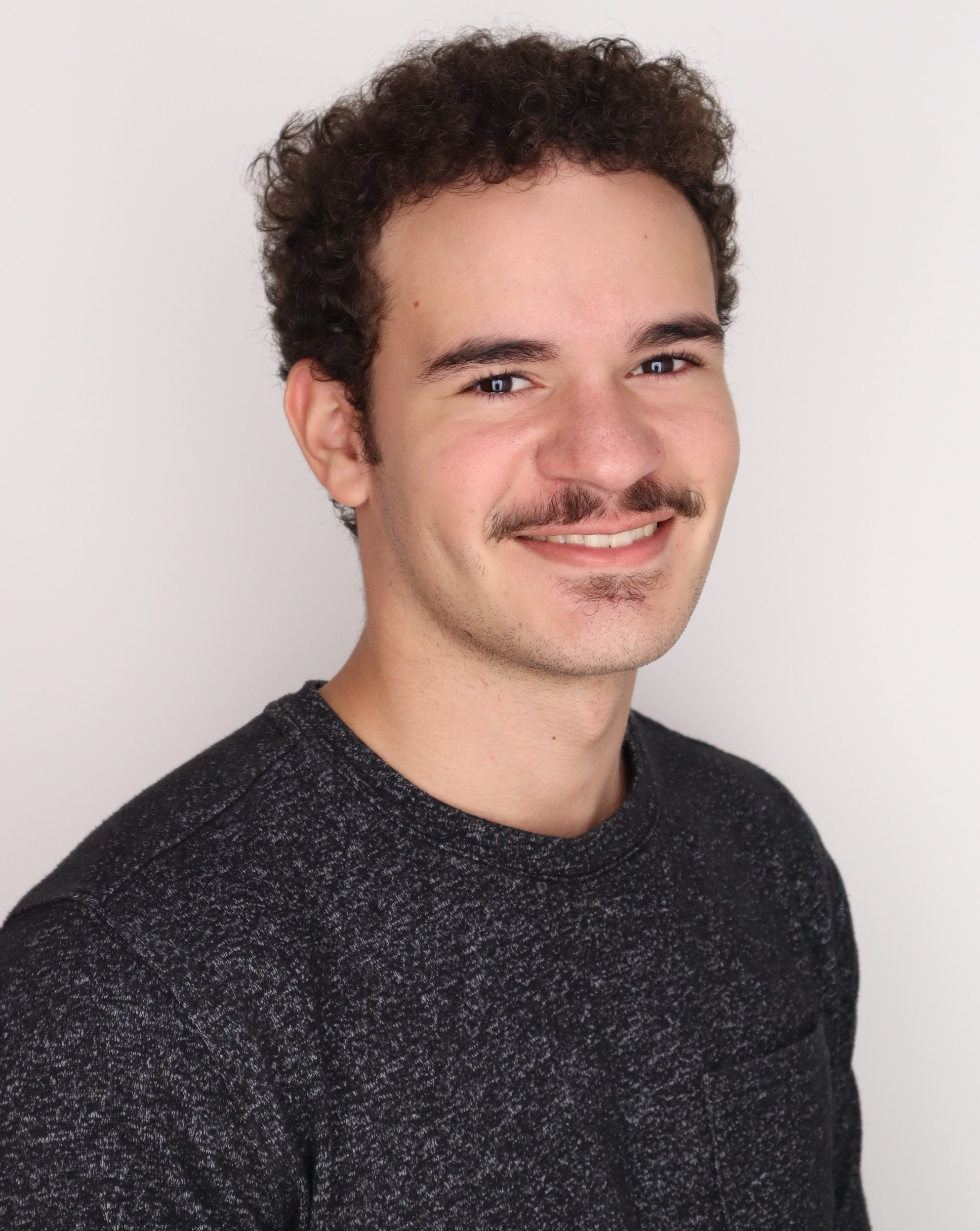
BIO
My name is Gabriel Martinez and I am originally from Miami, Florida. I am currently a sophomore studying as a Theatre BA, emphasizing performance and design. My research interests have to do with the creative arts, specifically storytelling and constructing designs for an audience. My career goals intertwine with my interests, in which I am striving to hopefully perform in numerous environments, film and stage, and have closer ties to the performing arts. I am also interested in creative design, including graphic and technical design such as carpentry and lighting design.
Incorporating Documentary Filmmaking into the Fundamentals of Research
Authors: Gabriel Martinez, Donald GjokaStudent Major: Theatre
Mentor: Donald Gjoka
Mentor's Department: Computer Science Mentor's College: Florida State University Co-Presenters:
Abstract
Documentary filmmaking is an essential tool for informing, educating, and sparking thought by revealing raw, unfiltered truths, allowing audiences to explore the world beyond fiction. By focusing on stories that deepen the understanding of larger-scale events, constructing these informative videos through captured footage, interviews, and referenced images benefits both the audience and researchers, who collectively learn from the process. Using the program Da Vinci’s Resolve, we’ve created three documentaries that demonstrate this, utilizing technical strategies and detailed analysis to offer commentary on historical narratives surrounding WWII and intermarriage, a locally renowned weeping angel statue, and current LGBT issues and identity. The three carefully crafted documentaries, each exploring different aspects of life, show the impact on both participants and viewers, where those sharing their stories reach a wider audience, and viewers gain a personal perspective on familiar events. The purpose behind focusing on distinct subject matters is to tackle different areas of storytelling as they pertain to engaging an audience. Our participants, who were part of key historical moments often overlooked, allowed us to share their rich histories, enriching the public's understanding while inviting the audience to learn about compelling small-scale stories that highlight broader events, more personalized stories that they may sympathize with. From the struggles of intermarriage during WWII, LGBT issues, and the unique tale of a weeping angel statue, raising awareness of these individual stories is a testament to our team’s editing and scriptwriting, demonstrating the importance of accuracy, time management, and structure in effective storytelling.
Keywords: Documentary Filmmaking, WWII Intermarriage, Technical Strategies, LGBTQ Issues, Public Awareness
25th annual Undergraduate Research Symposium, April 1, 2025
Shaniya Raphael Poster Session 4: 3:00 pm - 4:00 pm/ Poster #179
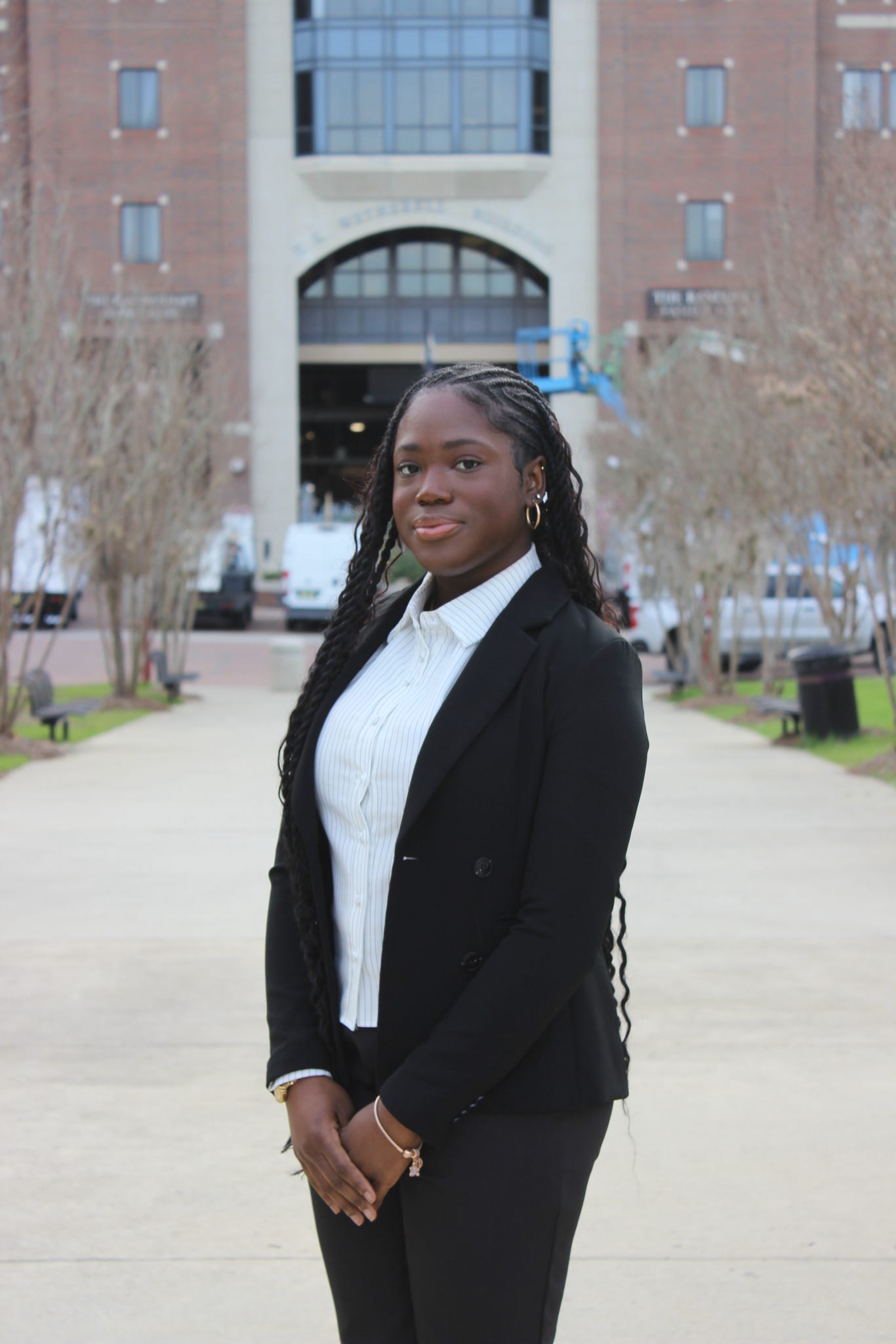
BIO
I am a Biological Science major on the pre-med track at Florida State University. As a first-generation college student from Miami, FL, I am passionate about advancing in the field of medicine. My current interests include emergency medicine, dermatology, and neuroscience. Beyond academics, I actively engage in clinical and research experiences. I volunteer at the Bixler Emergency Center at Tallahassee Memorial Hospital, where I gain hands-on exposure to patient care. My research interests include public health topics such as COVID-19 vaccine hesitancy in Alzheimer’s patients. On campus, I am deeply involved in organizations that support minority women in medicine. As the Co-Director of Fundraising for the National Society of Black Women in Medicine, I take pride in raising funds to support and empower underrepresented women pursuing medical careers.
Relationship Between COVID-19 Vaccine Hesitancy in Alzheimer's Patients and Their Caregivers and Income
Authors: Shaniya Raphael, Yijiong YangStudent Major: Biological Science
Mentor: Yijiong Yang
Mentor's Department: Nursing Department Mentor's College: College of Nursing Co-Presenters:
Abstract
The spread of Coronavirus disease 2019, COVID-19, has affected various groups of people, including Alzheimer’s patients. To decrease the spread of this virus many vaccines have been produced. Although vaccines are put in place as protection, caregivers of Alzheimer’s patients express hesitancy in having patients receive COVID-19 vaccines. Many factors influence the percent of hesitancy, such as income. The purpose of this study was to analyze how income level influences COVID-19 vaccine hesitancy among Alzheimer’s patients and their caregivers. Medical house records were checked from a population of 48,670 participants. These records were used to answer how many doses of the COVID-19 vaccine they received, whether or not they have Alzheimer’s, and their income. After the data was documented in the All of Us research database, raw data specific to this research question was filtered out, focusing on the 5,401 patients that have Alzheimer’s. The results showed that 4 participants received 0 doses, 663 participants received 1 dose, 1888
participants received 2 doses, and 2846 participants received 3 doses, while falling within different income ranges. Based on the data spread, some differences can be seen between the different income groups within Alzheimer’s patients. These differences and results can be used to identify what resources need to be provided to lower income Alzheimer’s patients to ensure equal opportunity to healthcare patients.
Keywords: COVID-19, Alzheimer's, Hesitancy, Income
25th annual Undergraduate Research Symposium, April 1, 2025
Lucas Stone Poster Session 3: 1:45 pm - 2:45 pm/ Poster #165
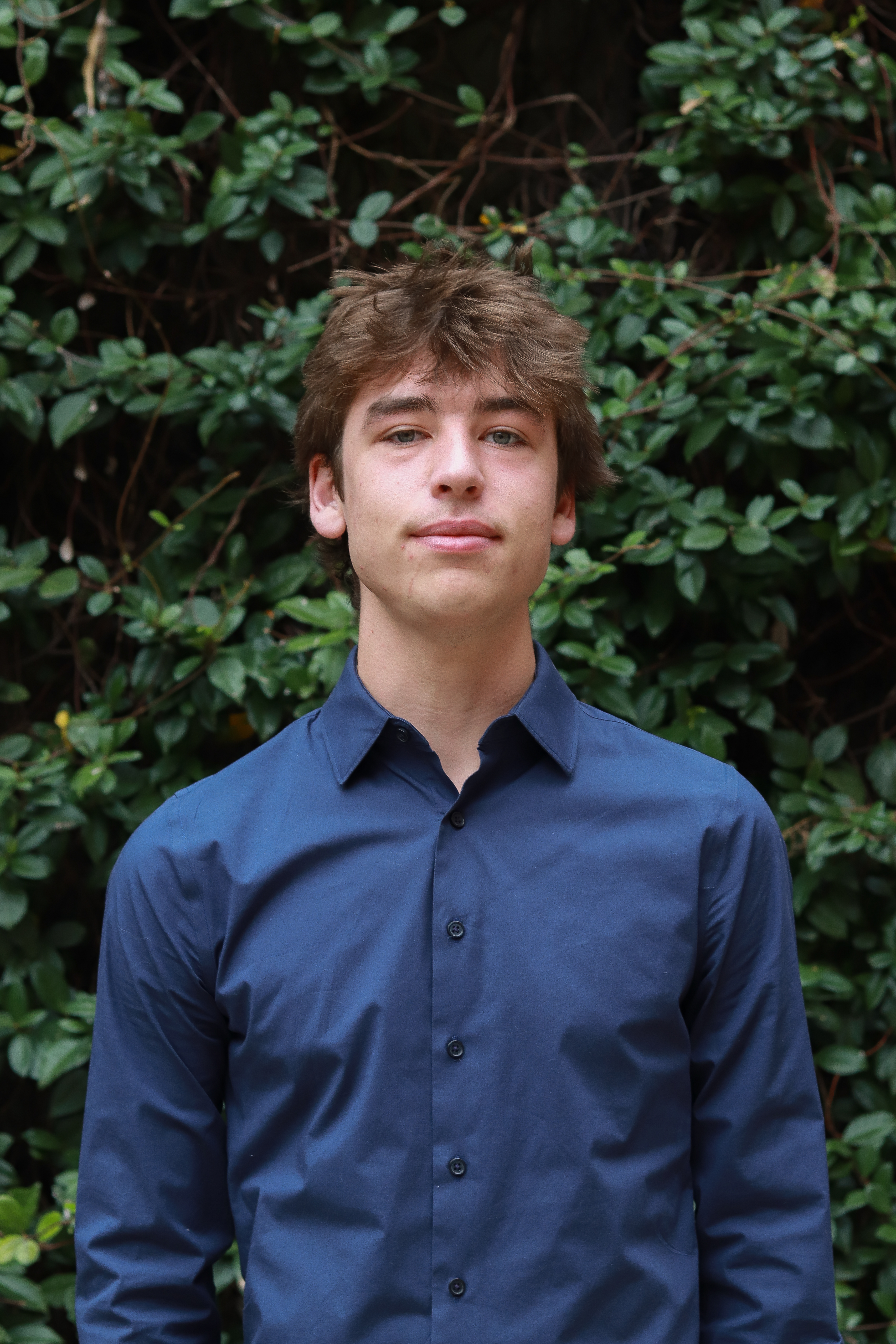
BIO
Lucas Stone is a second-year undergraduate student from Jacksonville, FL, with a strong passion for computer science and mathematics. He aspires to pursue a career as a software engineer. Under the mentorship of Dr. Chen Huang in the Department of Scientific Computing, Lucas conducted research on computational structure searches—an approach that uses algorithms to determine the most stable configuration of a material, eliminating the need for experimental trial and error.
Exploring the Lowest-Energy Structures of Boron Nitride
Authors: Lucas Stone, Dr. Chen HuangStudent Major: Computer Science
Mentor: Dr. Chen Huang
Mentor's Department: Scientific Computing Mentor's College: Arts and Sciences Co-Presenters:
Abstract
Understanding the atomic structures of materials is crucial in physics,
chemistry, and materials science. Structural searches identify the most
stable (lowest-energy) configurations of materials, which is essential since
experimentally determining these structures can be time-consuming and
technically challenging. Computational methods provide an efficient
alternative, enabling material predictions without extensive experiments. In
this work, we perform a structural search for boron nitride (BN), a compound
widely used in cutting and grinding metals, high-temperature-resistant
materials, and electrical insulators. Using the CALYPSO program, which
employs particle swarm optimization (PSO) for global optimization, we
generate approximately 900 different structures. Density functional theory
(DFT) calculations are then used to evaluate their enthalpies. Our results
reveal that the lowest-energy structures belong to the 216th space group, F-
43m, providing valuable insights into BN’s stability and potential
applications.
Keywords: Material Science, Scientific Computing, Physics
25th annual Undergraduate Research Symposium, April 1, 2025
Ronan Connell Poster Session 1: 9:30 am - 10:30 am/ Poster #212

BIO
Ronan Connell is a driven individual from Rowayton, CT, with aspirations of becoming an NFL general manager. Currently a FSU Presidential Scholar, Ronan is committed to academic excellence while also serving as the Esports Director for Outlast Gaming. With a passion for sports management and a strong leadership background in esports, Ronan hopes to make significant strides in the world of professional sports.
Optimal NFL Play Call in Short Yardage Situations
Authors: Ronan Connell, David PiferStudent Major: Finance
Mentor: David Pifer
Mentor's Department: Sport Management Mentor's College: College of Education, Health, and Human Sciences Co-Presenters:
Abstract
This research examines the optimal play call for short-yardage situations in the NFL, an area with limited prior analysis. Understanding which play type—run or pass—is most effective in these scenarios could provide valuable insights for coaches and analysts. Using nflreadR, I filtered relevant data from recent seasons and implemented logistic regression models in R to assess the success rates of different play types. Additionally, I manually categorized certain plays, such as designed quarterback runs, to ensure a more precise analysis.
The findings indicate that running plays are generally more effective than passing plays in short-yardage situations. Additionally quarterback runs instead of running back runs, no-huddle tempo, and jumbo packages are all more effective at converting than other formations or tempos. The more defenders in the box, the greater the distance to the first down and goal line situations all decrease the likelihood of success. The model I helped create predicts success with acceptable reliability and allowed for me to analyze if NFL teams under or over perform on average in these short yardage situations.
These insights have important implications for play-calling strategies in the NFL. If teams optimize their approach based on these findings, they may improve short-yardage conversion rates by favoring run-heavy play calls in appropriate situations. This research contributes to the growing field of football analytics and could inform decision-making at the professional level.
Keywords: football, NFL, data analytics
25th annual Undergraduate Research Symposium, April 1, 2025
Aaliyah Daflaar Poster Session 1: 9:30 am - 10:30 am/ Poster #43

BIO
I am a junior at Florida State University, pursuing a degree in psychology with a minor in child development. Originally from the beautiful Caribbean Island of Sint Maarten, I have always been deeply aware of the challenges surrounding mental health, particularly the stigma that prevents many from seeking help. Growing up, I witnessed firsthand how mental health struggles were often overlooked or misunderstood, which inspired me to become an advocate for change.
My research interests include Alzheimer's disease, ADHD, and the psychological effects of procrastination, topics that not only intrigue me academically but also hold personal significance. Through my studies and research, I aim to deepen my understanding of cognitive and behavioral health while finding ways to improve support systems for those in need.
In the future, I aspire to become a clinical psychologist, dedicating my career to helping others heal and fostering greater mental health awareness and accessibility. Beyond my professional goals, I am committed to giving back to my community, working to break generational cycles of stigma, and ensuring that mental health care becomes a priority rather than an afterthought.
Predicting Alzheimer's: A Cognitive Skills Approach to Early Detection
Authors: Aaliyah Daflaar, Dr. Dorota Kossowska-KuhnStudent Major: Psychology
Mentor: Dr. Dorota Kossowska-Kuhn
Mentor's Department: Psychology Mentor's College: Florida State University Co-Presenters: Maria Lima Sandim
Abstract
The most common type of dementia, Alzheimer's disease (AD), affects millions of people globally and puts a heavy burden on healthcare systems. For the purpose of intervention and disease management, early diagnosis is essential. This study examines meta-analyses of previous research to see how well cognitive test measures predict AD. To achieve a thorough understanding of trends in cognitive decline across a variety of demographics, the study covers participants 55 years of age and older, both with and without cognitive impairment.
The Mini-Mental State Examination (MMSE), Clinical Dementia Rating (CDR), and Judgment of Line Orientation (JLO) are important cognitive tests that measure executive function, memory, and visuospatial abilities. The goal of this study is to determine the best accurate metrics for early AD detection by thoroughly examining cognitive evaluation techniques and their predictive validity.
According to preliminary findings, blood-based biomarkers including cfRNA and neuro-exosomal proteins have a high predictive value for AD, and cognitive modeling accurately predicts the disease. Furthermore, BMI, genetic risk factors, and cerebrospinal fluid (CSF) biomarkers including YKL-40 and VILIP-1 provide insights into the course of the disease. These results provide credibility to the use of biomarkers in conjunction with cognitive models to increase diagnostic precision.
This study offers important new information on cognitive evaluation techniques, which will support clinical judgment in the future and improve early AD identification techniques.
Keywords: Alzheimer's Disease, Psychology, Meta-Analysis
25th annual Undergraduate Research Symposium, April 1, 2025
Harleigh Demchak Poster Session 3: 1:45 pm - 2:45 pm/ Poster #107
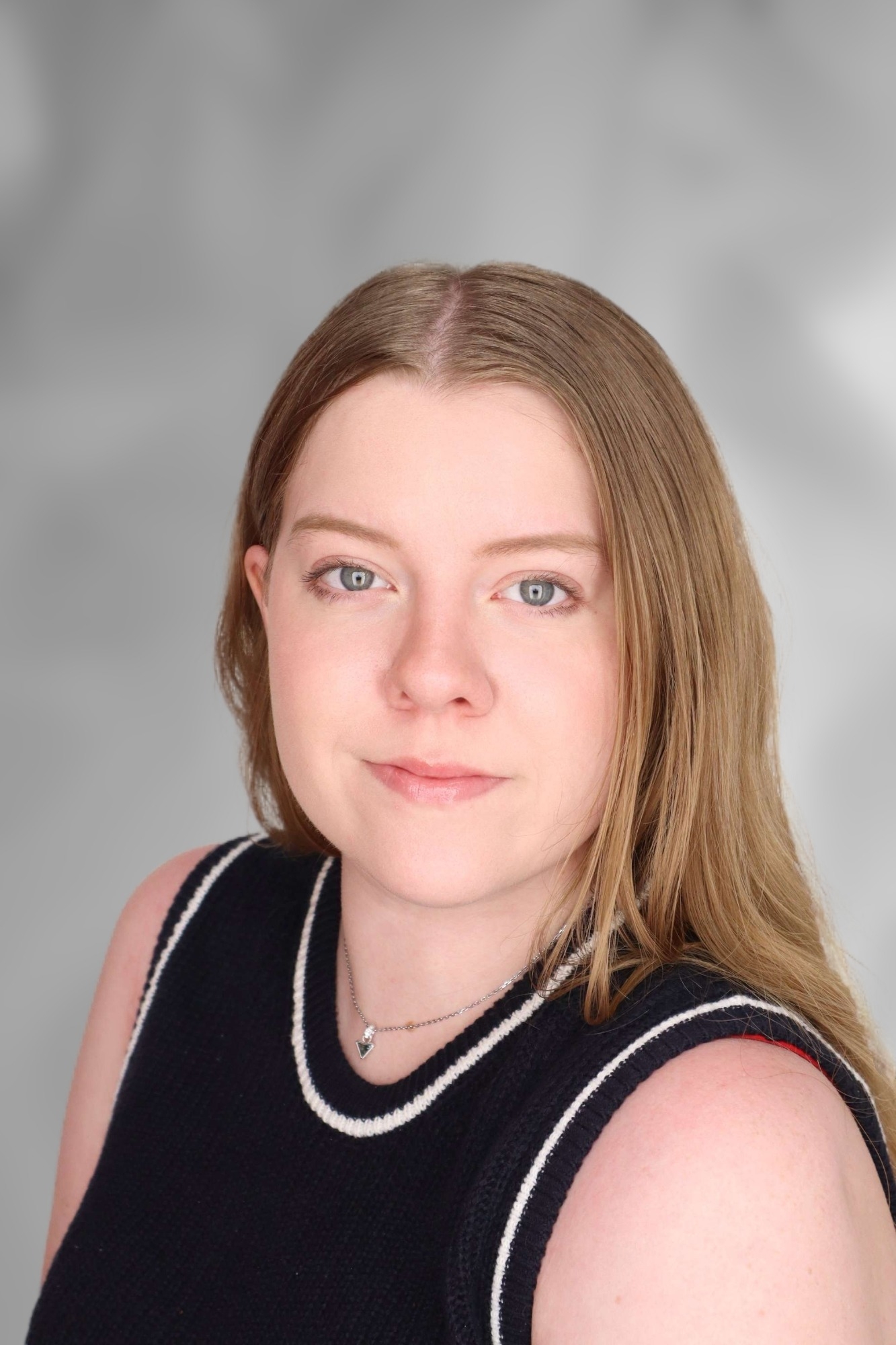
BIO
I am an undergraduate student from Orlando majoring in economics pursuing an interest in law. I am passionate about researching different areas of social sciences and education, due to their many implications.
Turning Pages, Turning Minds: Scaffolding Conversations During Shared Book Reading
Authors: Harleigh Demchak, Deborah SlikStudent Major: Economics
Mentor: Deborah Slik
Mentor's Department: Reading Education and Language Arts Mentor's College: Anne Spencer Daves College of Education, Health, and Human Sciences Co-Presenters:
Abstract
This research explores the question: “What are the effects of practice-based coaching, delivered via text messaging to support fidelity of scaffolding implementation, on paraprofessionals' use of scaffolding strategies during shared book reading?”. Paraprofessionals in early childhood classrooms often lack access to effective professional development. Practice-based coaching is a promising approach to train them in implementing scaffolded conversations, which supports evidence-based literacy practices. Shared book reading is an effective method for developing oral language skills, like speaking and listening, which improves language comprehension in preschoolers. The method involves baseline readings where paraprofessionals ask their students five sets of questions, without guidance on effective use. After this, an intervention stage introduces how to scaffold conversations. Paraprofessionals then practice these strategies in subsequent readings. Following a few days without readings, they are observed in the classroom to assess if their use of scaffolding has improved. The research assistant role includes preparing materials for the books, coding text messages to ensure fidelity in coaching, and testing the intervention slides and presentation. In addition, coding fidelity for audio recordings of both the readings and the intervention training, ensures adherence to research guidelines. The expected results are that the paraprofessionals will improve their use of scaffolding strategies because of the text message coaching. This will likely enhance their ability to support student comprehension and provide evidence-based tools for improving their teaching effectiveness.
Keywords: Education, Reading, Communication
25th annual Undergraduate Research Symposium, April 1, 2025
Sarah Drake Poster Session 1: 9:30 am - 10:30 am / Poster #271
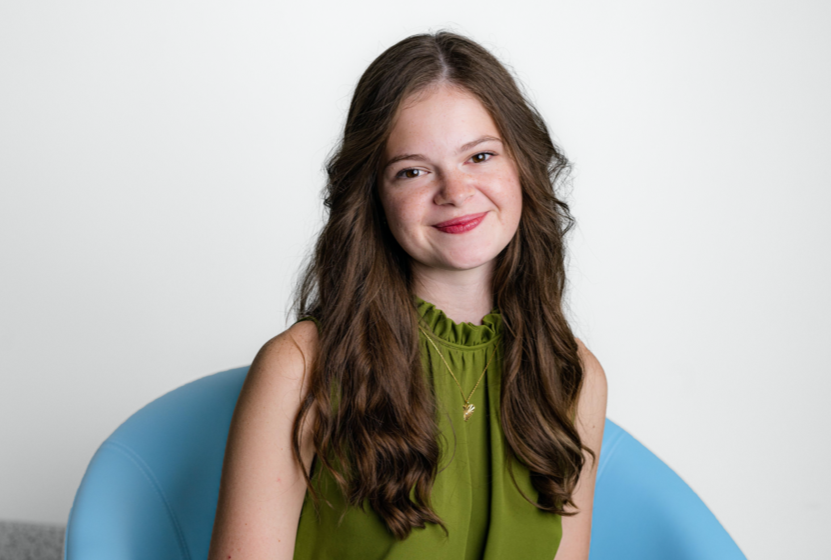
BIO
I'm a senior studying Psychology, Chemistry, and Biology here at Florida State University. I was born and raised in Tallahassee, FL and have a passion for Neuroscience. I am interested in researching sleep in adolescents and how that is attributed to sleep disorders such as Insomnia. My hobbies outside of academics include teaching ballet, traveling, and learning about new cultures. After receiving my bachelor's degree, I hope to continue research while obtaining my Ph.D.
Factors Influencing Parent-Child Agreement in Reporting Mental Health Symptoms
Authors: Sarah Drake, Tehila Nugiel, Ph.D.Student Major: Psychology, Chemistry, Biology
Mentor: Tehila Nugiel, Ph.D.
Mentor's Department: Department of Psychology Mentor's College: College of Arts and Sciences Co-Presenters: Savannah Wyckoff, Kayla Framelli
Abstract
Many developmental studies use parent and child reported measures, yet correspondence between reports can vary. Measures of anxiety, depression, and suicidality tend to be more difficult for parents to report accurately, as internalizing symptoms are not easily observable. The purpose of this investigation is to evaluate the agreement between parent and child reports using the KSADS (Kiddie Schedule for Affective Disorders and Schizophrenia) measures of depression, anxiety, and suicidality. This study will examine how factors such as the child’s gender, family income, as well as family conflict (measured by the Family Environment Scale) and parental monitoring, influence the agreement between parent and child reports. Both family conflict and parental monitoring will be assessed using parent self-report. Our research utilizes data from the Adolescent Brain Cognitive Development (ABCD) Study, a longitudinal project examining the health and cognitive development of over 11,000 socio-demographically diverse youth. To assess agreement between parent and child reports, we will correlate the two, and a difference score will be calculated to measure discrepancies. We hypothesize that child gender and family income will influence the agreement of parent-child reports, based on prior literature which reveals mixed findings regarding their impact on the degree of agreement. We also hypothesize that parent-child agreement on symptoms will be associated with decreased family conflict and will show no association with the levels of parental monitoring. By identifying patterns in parent-child agreement, we can inform future research on factors that influence reporting accuracy, leading to more reliable mental health assessments for youth.
Keywords: ABCD, Anxiety, Depression, Youth
25th annual Undergraduate Research Symposium, April 1, 2025
Savannah Wyckoff Poster Session 2: 10:45 am - 11:45 am/ Poster #271
BIO
I'm a senior majoring in Biology and graduating this spring of 2025! My research interests broadly include mental health, the gut-brain axis, gut microbiome and epigenetics. Post graduation, I want to pursue a MD-PhD program and gain more research experience. Outside of being a student, I enjoy going to the medical examiners to shadow different cases, spending time with friends and family, training puppies to be service dogs, and going to the gym.
Factors Influencing Parent-Child Agreement in Reporting Mental Health Symptoms
Authors: Savannah Wyckoff, Tehila NugielStudent Major: Biology
Mentor: Tehila Nugiel
Mentor's Department: Psychology Mentor's College: Arts & Sciences Co-Presenters: Sarah Drake & Kayla Frameli
Abstract
Many developmental studies use parent and child reported measures, yet correspondence between reports can vary. Measures like anxiety and depression tend to be more difficult for parents to report accurately, as internalizing symptoms are not easily observable. The purpose of this investigation is to evaluate the agreement between parent and child reports using the parent-reported Child Behavior Checklist (CBCL) and shorter version of the CBCL, the child-reported Behavior Problem Monitoring (BPM) that measure internal and external symptoms. This study will examine how factors such as the child’s gender, family income, as well as family conflict (measured by the Family Environment Scale) influence the agreement between parent and child reports. Family conflict will be measured using parent and child self-report in the Family Environment Scale. Our research utilizes data from the Adolescent Brain Cognitive Development (ABCD) Study, a longitudinal project examining the health and cognitive development of over 11,000 socio-demographically diverse youth. To assess agreement between parent and child reports, we will correlate the two, and a difference score will be calculated to measure discrepancies. We hypothesize that child gender and family income will influence the agreement of parent-child reports, based on prior literature which reveals mixed findings regarding their impact on the degree of agreement. We also hypothesize that parent-child agreement on symptoms will be associated with decreased family conflict. By identifying patterns in parent-child agreement, we can inform future research on factors that influence reporting accuracy, leading to more reliable mental health assessments for youth.
Keywords: Agreement, Symptoms, Mental Health
25th annual Undergraduate Research Symposium, April 1, 2025
Jody Lin Poster Session 4: 3:00 pm - 4:00 pm/ Poster #138
BIO
I am currently a sophomore majoring in Accounting. I am originally from Tampa, FL. I hope to become an auditor in the future after completing my degree along with my CPA. Some of my research interests include the impact of AI on financial reporting and historical economic events.
The Big Push: Federal Road Building in the Early Days of the Automobile
Authors: Jody Lin, William CockrielStudent Major: Accounting
Mentor: William Cockriel
Mentor's Department: Economics Mentor's College: College of Social Sciences and Public Policy Co-Presenters: Anthony Menold & Connor Meadows
Abstract
The objective of this study is to examine the distribution of government-provided road funding across various states in the early 20th century, as automobiles began revolutionizing the United States economy. The Federal Aid Road Act of 1916 paved the way for cars throughout the U.S. by funding road-building projects proposed by state governments. Some states and counties proposed large, expensive projects but received less funding from the federal government compared to other state projects. The study relied on data entry from reports published by the U.S. Department of Agriculture. Using this new data source, heat maps were created to visually display what areas in the country had the highest cost in road building. In addition, Excel graphs that use plots of total costs and total aid suggest that Kansas, Texas, and Illinois proposed the highest-cost projects. However, Missouri, Pennsylvania, and New York received the most federal aid. Ultimately, the results of this study will lay the foundation for further research in the future, such as what economic factors were present at the time of construction, which could answer how these roads influenced automobile adoption, economic development, and productivity. While this research has answered the “what” concerning the dispersions of road cost and aid, future observations can answer the “why?”
Keywords: Roadbuilding, automobile, federal roads, road funding
25th annual Undergraduate Research Symposium, April 1, 2025
Ashley Mila Poster Session 4: 3:00 pm - 4:00 pm / Poster #222
BIO
My name is Ashley Mila and I am originally from Miami, FL and currently pursuing a double degree in Biology and Criminology on a pre-med track. My research interests are inorganic material synthesis and magnetic behaviors. Besides research, I also work as medical assistant and Chemistry tutor and I am currently earning my Emergency Medical Responder certification. Upon graduation, I hope to attend medical school and become a reconstructive plastic surgeon.
Intercalation of Magnetic Properties of Iron Intercalated Vanadium DiTelluride
Authors: Ashley Mila, Milo AdamsStudent Major: Biology and Criminology
Mentor: Milo Adams
Mentor's Department: Chemistry Mentor's College: Arts and Sciences Co-Presenters:
Abstract
Layered two-dimensional materials, such as transition metal dichalcogenides
(TMDs), express magnetic and electronic properties that could make them useful
in a variety of electronic devices, such as MRIs or photodetectors. However,
metallic TMD’s have limitations to real world applications, namely structural
instability under ambient conditions. The Shatruk lab has previously
demonstrated that light transition metal intercalation can stabilize VTe2 and
promote ferromagnetic (FM) ordering. Intercalation studies using Cr reveal
complex structures with some Cr substitution of in-layer V atoms as well as light.
In this research, we investigate the intercalation
of Fe into the VTe2 to produce new, air-stable
crystalline compositions of Fe0.3V0.6Te2,
Fe0.4V0.7Te2, Fe0.5V0.5Te2, and Fe0.5V1.2Te2. Here
we present the elemental and structural
characterization of the compounds. Our results
have revealed that Fe, like Cr, undergoes a
complex combination of substitution and
intercalation which ultimately stabilizes VTe2,
yielding a more thermodynamically stable
material which is less air-sensitive and may
exhibit ferromagnetic ordering.
Keywords: Magnetic, Intercalation, vanadium
25th annual Undergraduate Research Symposium, April 1, 2025
Brianna Bonich Poster Session 2: 10:45 am - 11:45 am/ Poster #41
BIO
I am a dedicated student pursuing a major in Philosophy with a minor in Music, currently on the pre-law track. With a deep passion for both the intellectual rigor of law and the emotional power of music, I'm taking a unique academic path that blends these fields to prepare for a career as an entertainment lawyer. Motivated by a commitment to justice, empowerment, and the creative community, I seek to bridge the gap between artistry and law, fighting for the rights and interests of musicians in all areas of their careers.
The Legal Beat
Authors: Brianna Bonich , Rob McNeelyStudent Major: Philosophy
Mentor: Rob McNeely
Mentor's Department: Law Mentor's College: Florida State University Co-Presenters:
Abstract
This paper examines legal frameworks in the music industry by investigating copyright lawsuits, A.I litigation, and historically relevant trends, synthesizing the information gathered with an emphasis on how the intersection of law and the music industry affects artists, and developing inferences based on what was found. In doing so, it highlights the impacts these frameworks have on artists and their creativity when interacting with the industry. The main strategy used was a qualitative analysis of the data collected and synthesis of that information in relation to the “bigger picture” of legal implications in the music industry on artists and their creativity. This paper argues that these legal frameworks are imperative for protecting, supporting, and advertising artists creativity. In such a dynamic environment, it’s important to analyze the affects the law has on the industry and the affects new technologies in the industry have on new laws. Analyzing these affects and understanding their implications for legal frameworks in the industry will help support production of the arts, improve artists careers, and create a healthier industry environment that all parties benefit from.
Keywords: entertainment, music, law, entertainment law, IP law
25th annual Undergraduate Research Symposium, April 1, 2025
Alexander DeLise Poster Session 2: 10:45 am - 11:45 am/ Poster #35
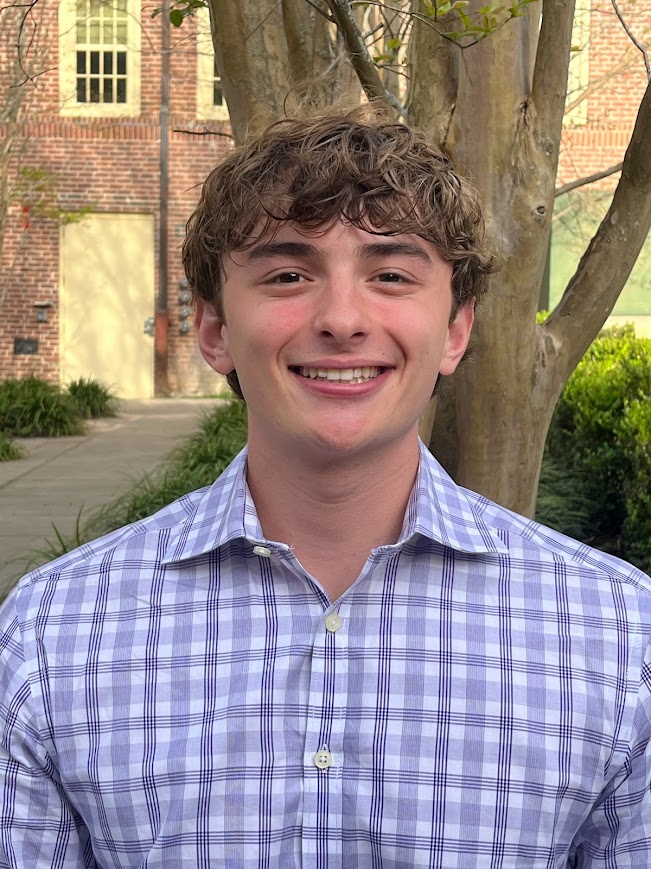
BIO
Alex DeLise is an undergraduate student at Florida State University majoring in Applied Mathematics and Computational Science. With a strong interest in industrial engineering and operations research, Alex is drawn to mathematical modeling and optimization techniques for improving decision-making in complex systems. They plan to pursue a Ph.D. in Operations Research, focusing on data-driven approaches to resource allocation, logistics, finance, and other large-scale optimization challenges. Alex aims to develop innovative methods that bridge theoretical research and practical applications, contributing to advancements in efficiency and problem-solving across various industries.
Data-Driven Patient Allocation Optimization with Epidemic and Vaccine Modeling
Authors: Alexander DeLise, Seyedreza AbazariStudent Major: Applied and Computational Mathematics, Computational Science
Mentor: Seyedreza Abazari
Mentor's Department: Department of Industrial and Manufacturing Engineering Mentor's College: FAMU-FSU College of Engineering Co-Presenters:
Abstract
Pandemics strain healthcare systems worldwide, creating urgent challenges in allocating limited resources like hospital beds while controlling disease spread. Effective patient allocation during such crises is critical to minimizing unmet healthcare demand and ensuring equitable healthcare access across regions. This study addresses these issues by developing a mixed-integer nonlinear mathematical model that integrates Susceptible-Infected-Recovered-Vaccinated (SIRV) epidemic dynamics with patient transfer and allocation to improve patient distribution during outbreaks. Our approach also factors additional disease transmissions caused by the assignment of patients to different regions. Our model minimizes unmet demand per county for hospital beds and incorporates real-world data in the model parameters. We observe that in large metropolitan areas, where access to healthcare is critical, the vaccinated scenario exhibits significantly lower unmet hospital demand compared to the unvaccinated scenario, an outcome directly tied to the vaccines' success in lowering peak infection rates as demonstrated by the SIRV dynamics. The reduction in infection surges not only alleviates hospital capacity strain but also leads to fewer total patient transfers, underscoring the effectiveness of vaccination during pandemics. This research demonstrates the potential to enhance pandemic response strategies. The model provides policymakers and healthcare administrators with a robust, data-driven tool to make informed decisions, reducing strain on overburdened facilities and improving patient outcomes during pandemic scenarios.
Keywords: COVID-19, Healthcare Facilities, Location Allocation, Optimization, Florida, Epidemiology
25th annual Undergraduate Research Symposium, April 1, 2025
Avery Karl Poster Session 3: 1:45 pm - 2:45 pm/ Poster #2
BIO
My name is Avery Karl, and I am a first-year majoring in Elementary Education. I am from St. Augustine, FL, and I am interested in research that involves aspects of both education and psychology. I am specifically interested in the concept of self-efficacy, so when I found this project, it sounded perfect for me. I would love to continue in the field of research and hope to teach second grade in the future.
From Roots to Results: Exploring Early Childhood Teachers' Journeys Through a Farm-to-School Training Program
Authors: Avery Karl, Camille LewisStudent Major: Elementary Education
Mentor: Camille Lewis
Mentor's Department: Educational Psychology: Learning and Cognition Mentor's College: Anne's College of Education, Health, and Human Sciences Co-Presenters: Kaylen Burgess
Abstract
Childhood obesity is a pervasive health problem in the United States that persists despite national efforts to combat it. This is largely due to a lack of fruits and vegetables in children’s diets. Farm-to-School Programs have been created to attempt to remedy this lack of nutrition and introduce students to gardening practices. This study explores the impact of a six-month professional development program on early childhood educators’ self-efficacy and knowledge in implementing Farm-to-School initiatives. This study addresses gaps in the current literature by assessing the effects of professional development training on the longevity of school gardening initiatives. A qualitative, single-case research design was utilized. A Farm-to-School training program was implemented among early childhood educators at the Early Childhood Center for Excellence. This consisted of gardening classes, on-going modeling, and Farm-to-School coordination. Data was collected in focus groups, semi-structured interviews, and observations. Data analysis is currently underway, but preliminary results highlight several key themes. First, professional development programs can drive meaningful personal and professional growth among educators. Second, institutional support is essential for successful implementation of a Farm-to-School program. Finally, formal and informal reflective dialogue plays a pivotal role in inspiring innovative teaching practices and fostering deeper connections between educators and garden-based learning. This study highlights the importance of institutional support, such as dedicated planning time, and provides insights for the creation of teacher training programs. Future research can be conducted within educational policy to determine how policy creators’ self-efficacy regarding gardening practices relates to the implementation of educational policies.
Keywords: Educational Psychology, Self-Efficacy, Gardening, Professional Development

